I was learning on my feet every single performance.
First Lady of the Musical Theater
The star we know today as Julie Andrews was born Julia Elizabeth Wells in Walton-on-Thames, Surrey, then a small village, roughly 18 miles south of London, England. Her father, Ted Wells, was a schoolteacher and enjoyed the simple life of the countryside. Her mother, Barbara, a talented pianist, taught piano but longed for a career on the stage. Ted and Barbara Wells divorced on the eve of World War II, and Barbara married Ted Andrews, a professional singer. Ted and Barbara Andrews formed a musical act and toured England entertaining the troops. Ted Andrews gave the little girl her first singing lessons, and was immediately impressed with the child’s strong voice, large vocal range, perfect pitch and precocious musical ability. At age eight, she was taken to study with Lilian Styles-Allen, a noted concert singer. Styles-Allen trained her pupil in operatic repertoire and taught her the perfect diction for which she would become famous. Although Julia remained close to her father, she lived with her mother and took her stepfather’s surname when she joined the family act at age ten.
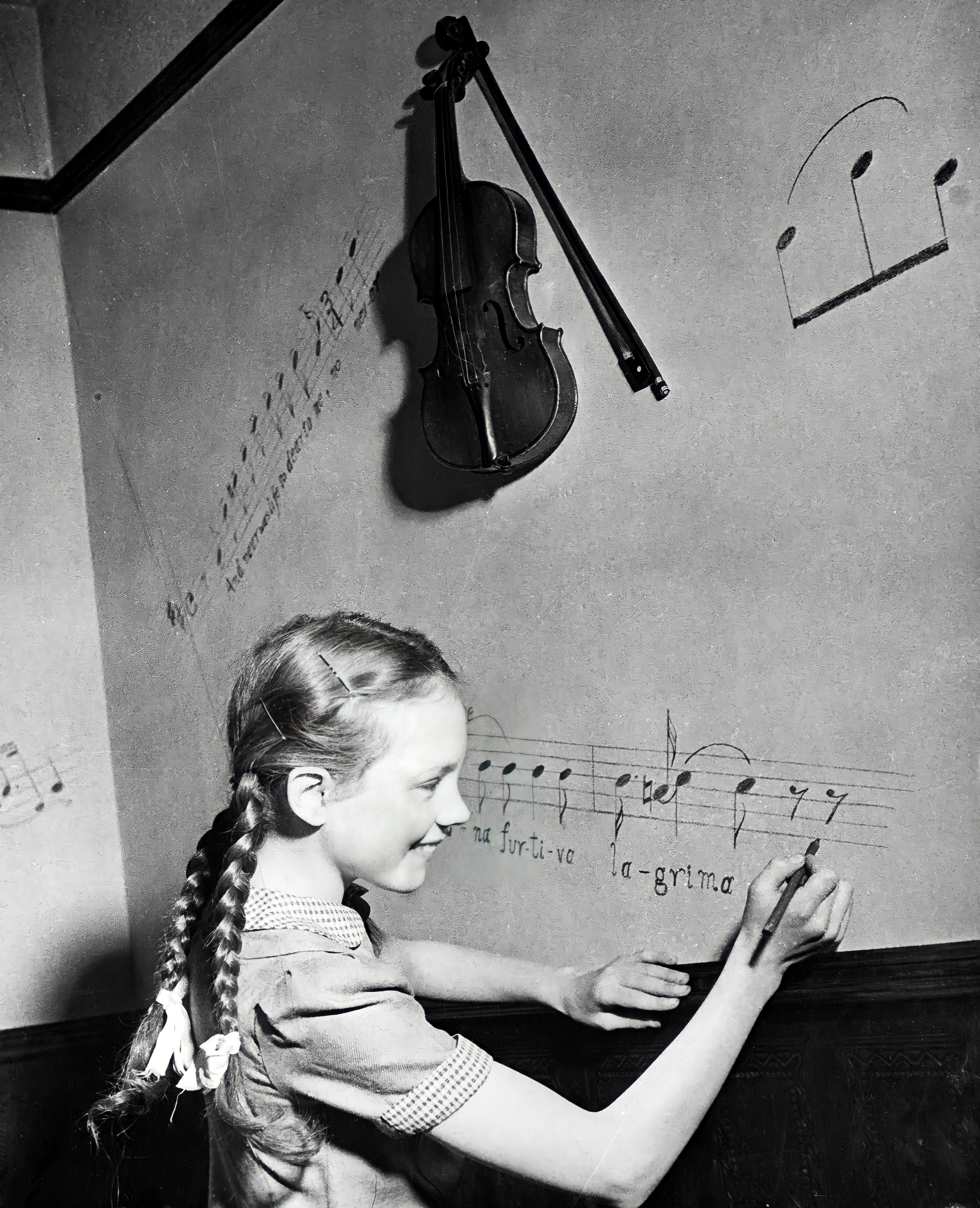
Julie Andrews, as she was now known, made her radio debut in 1946, singing a duet with Ted Andrews on a BBC variety show. She gave her first performance as a solo artist at London’s Stage Door Canteen, where she was seen by two members of the Royal Family, the mother and sister of the present Queen. The exquisitely self-possessed little girl with the crystal-clear voice was attracting the attention of serious theatrical management and was soon ready to make the move from provincial music halls to the theaters of London’s West End. At age 12, Julie Andrews was cast in a musical revue, Starlight Roof, at the London Hippodrome. Her first appearance stopped the show, and the revue ran for over a year. Julie Andrews became the youngest performer ever to appear at a Royal Command performance, singing an aria from Mignon for King George VI at the London Palladium.
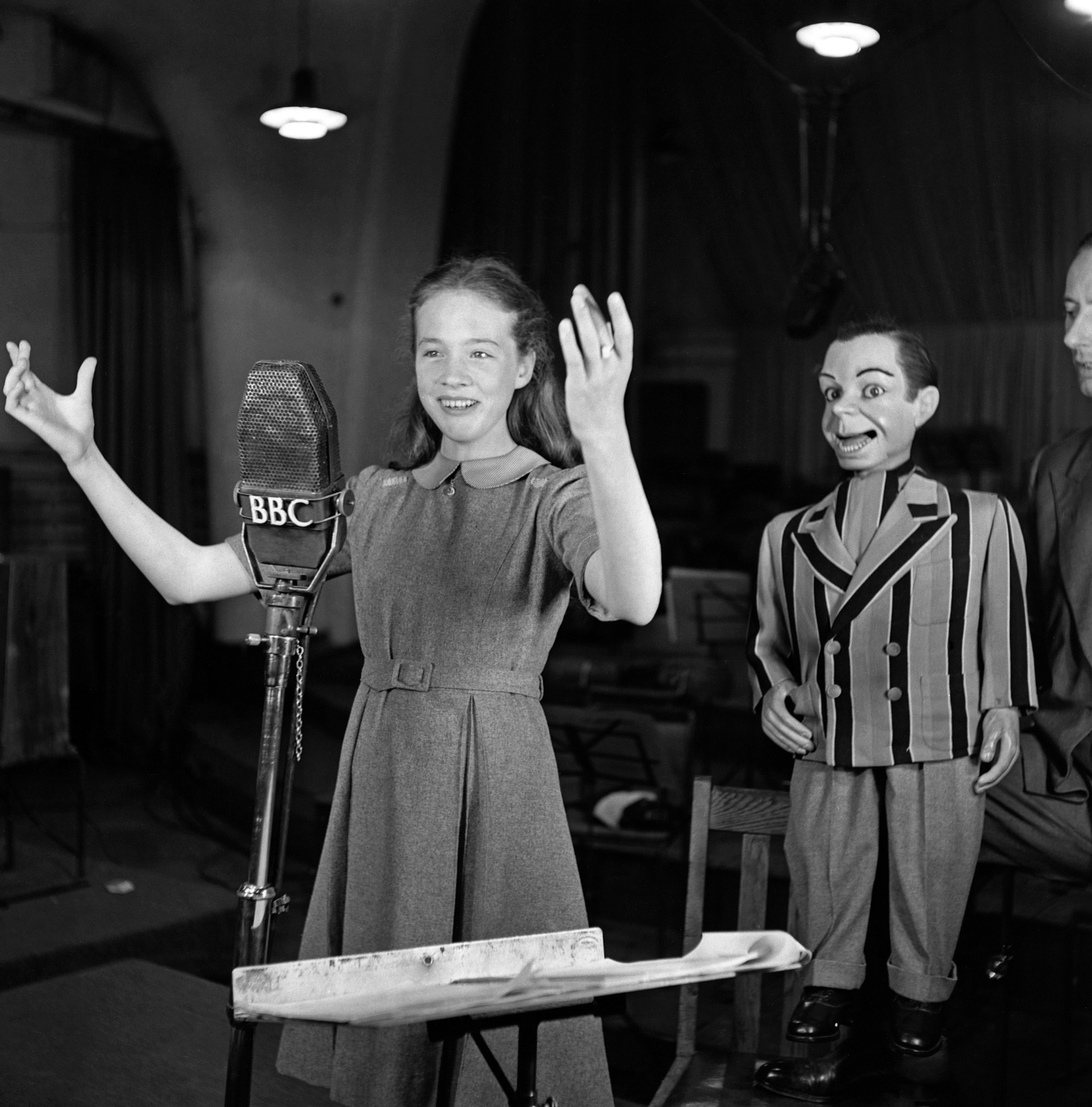
The American film studio, Metro-Goldwyn-Mayer, which had recently opened a London branch, made a screen test of the young singer, perhaps seeing her as a successor to the child singing stars of the pre-war era. The studio failed to offer her a contract, dismissing her as “unphotographable.” Nevertheless, she soon appeared on one of Britain’s first television variety programs.
The teenage Julie Andrews was a regular presence on popular British radio shows in the 1950s, and as she grew into young womanhood, she played leading roles in a series of Christmas pantomimes. The “pantos,” a holiday tradition in Britain, are popular family entertainments, usually based on a familiar fairy tale. Far from being silent, as the name might suggest, they typically include lots of singing, dancing and male comedians in drag. Each holiday season of her teens found Julie Andrews playing another fairy tale heroine, from Little Red Riding Hood to princesses in Aladdin and Jack and the Beanstalk. She was appearing in one of these when she met an aspiring artist named Tony Walton, who would play a large role in her later life. During the regular season, she continued to perform as a solo artist and with Ted and Barbara Andrews.
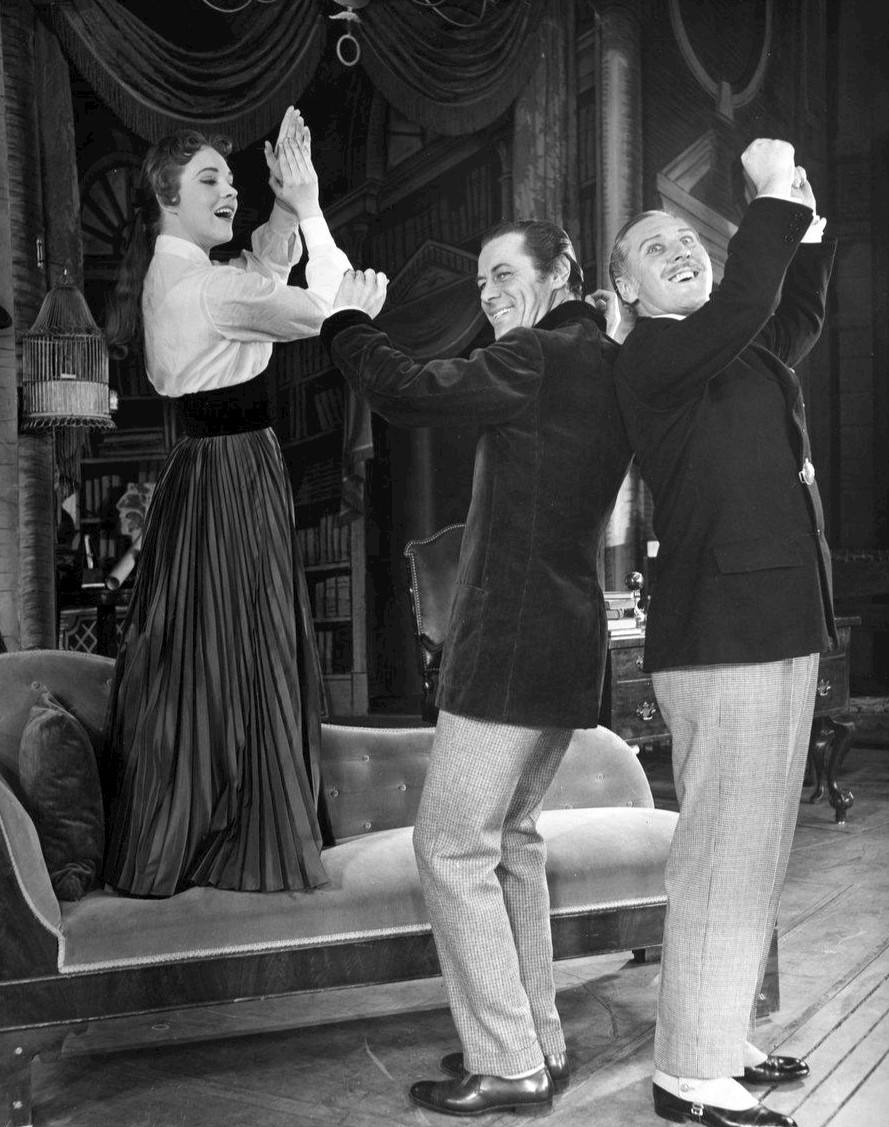
Julie Andrews was playing the title role in the pantomime Cinderella when she was first seen by the songwriter Sandy Wilson and the American producer Cy Feuer. Wilson was the creator of a popular West End musical, The Boy Friend, a pastiche of the musical comedies of the 1920s. Cy Feuer planned to bring the show to Broadway and wanted to recruit a British cast to preserve the flavor of the London production. When Feuer and his partner, Ernest Martin, offered Julie Andrews the lead in the Broadway production of The Boy Friend, she was reluctant to travel to America. She was only 18 and had never traveled so far from her family. She finally agreed to a one-year contract, and boarded the plane for the country where she would spend most of her life.
The Boy Friend was an immediate success on Broadway, and the teenage Julie Andrews was a sensation, delighting critics and audiences with her fresh good looks, grace, sparkling singing voice and gem-like diction. She was asked to audition for the words and music team of Alan Jay Lerner and Frederick Loewe, who were preparing the original production of My Fair Lady, their musical version of the play Pygmalion by George Bernard Shaw. Lerner and Loewe had not enjoyed a success on Broadway since Brigadoon, almost a decade earlier, and many Broadway hands doubted that the two could make a successful musical out of George Bernard Shaw’s classic comedy.
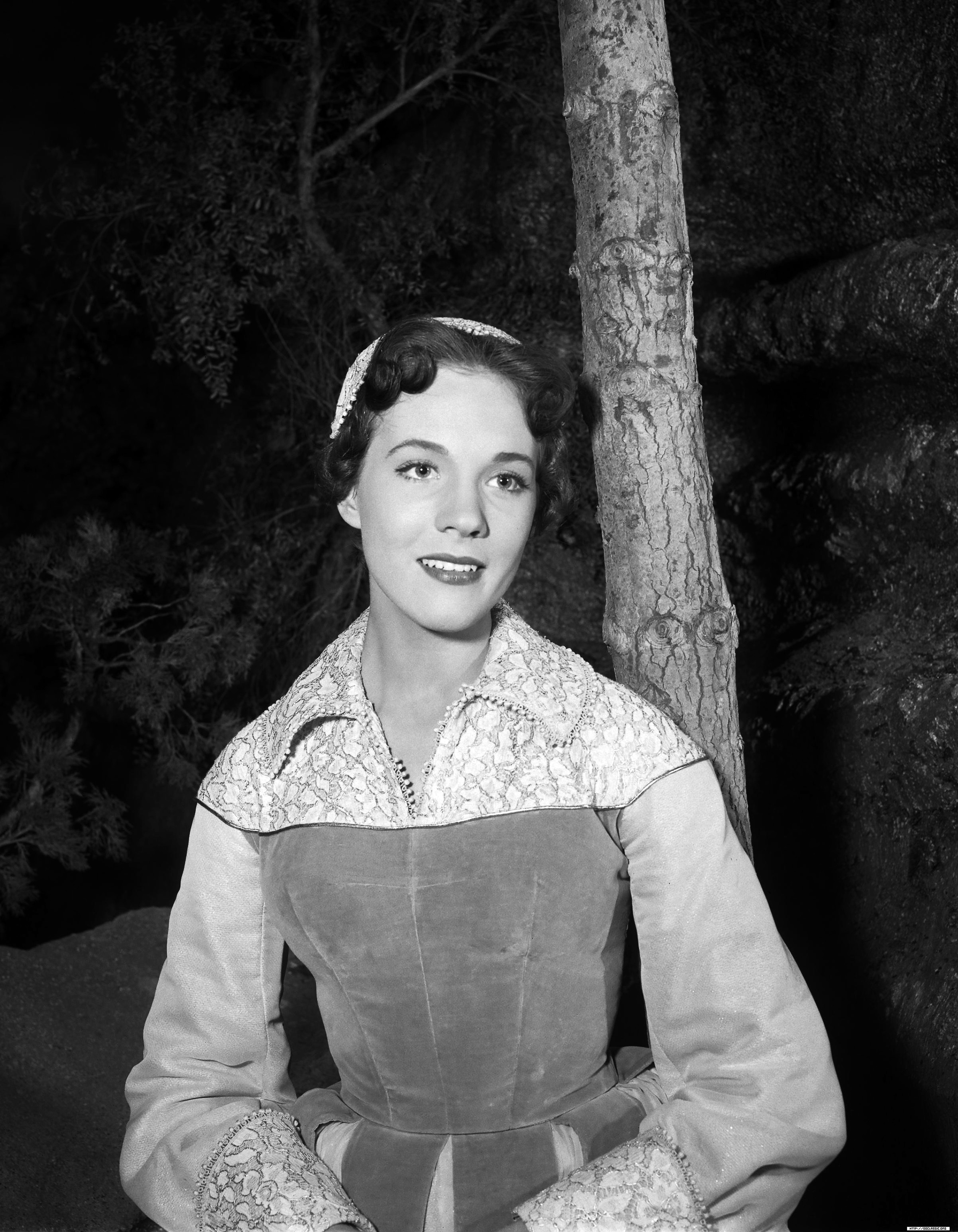
The role of Eliza Doolittle in Pygmalion — a bedraggled street urchin in the first act, transformed into a regal society beauty in the second — had already been played by many distinguished actresses on stage and screen. The musical adaptation called for a versatile young actress who was also an accomplished singer. Although a number of established stars coveted the part, Lerner, Loewe and director Moss Hart decided to take a chance on the 20-year-old Julie Andrews, who had never before acted in such a demanding role. Her costar, Rex Harrison, an experienced stage and film star, had never sung on stage before. The rehearsals were difficult. Although Andrews was more than capable of carrying off the demanding songs, her relative lack of acting experience caused unease in the company. Director Hart worked with her tirelessly, a process she recounts in her interview with the Academy of Achievement.
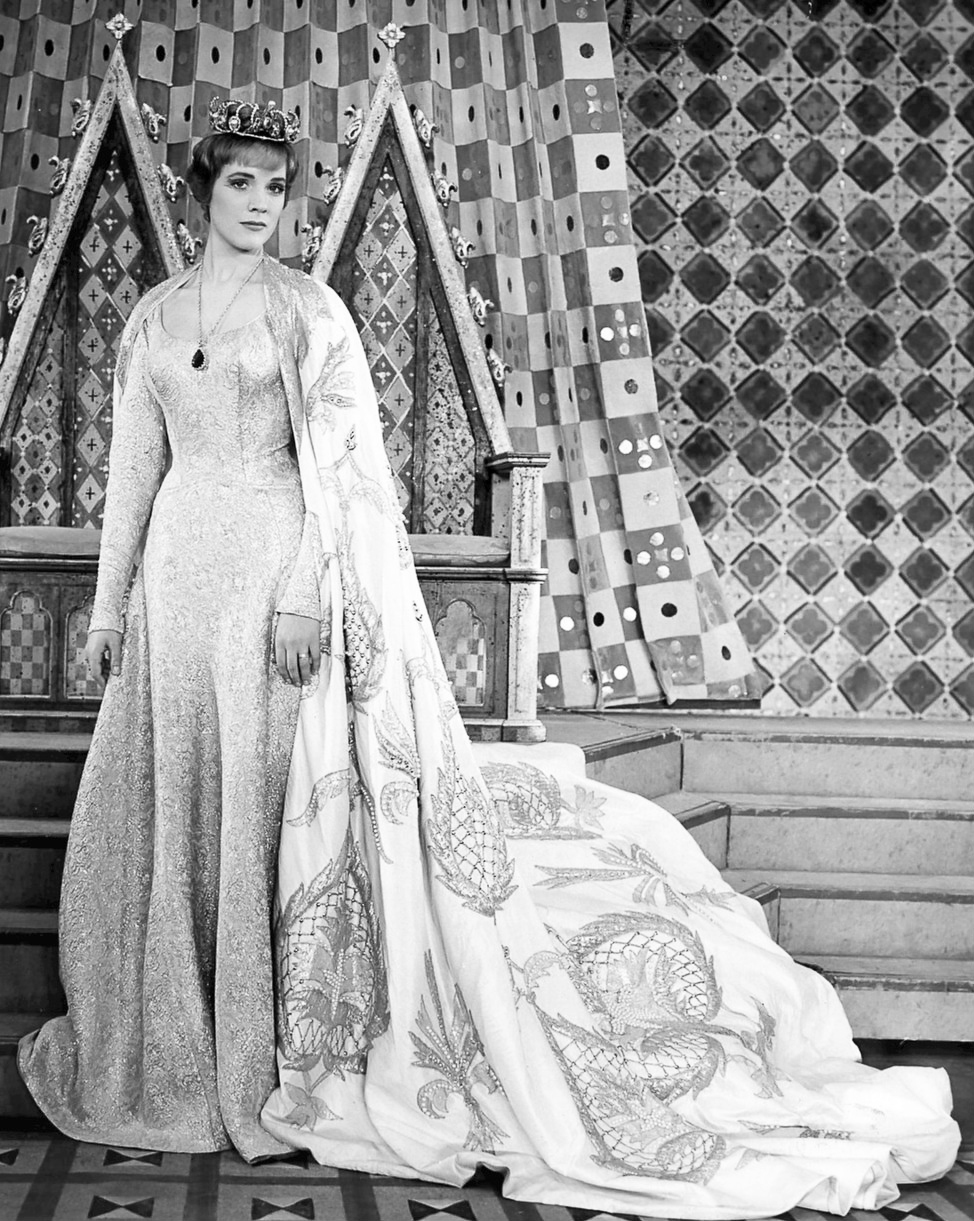
When My Fair Lady opened in 1956, it was an unprecedented success. Critics acclaimed it as the greatest musical ever staged and it sold out months in advance. Julie Andrews won universal praise for her incandescent performance. The original cast recording became a best-seller, one of the most successful releases in the history of Columbia Records. It remained a mainstay of the label’s catalogue for many years.
Days before the show opened, Andrews also made her American television debut in a musical version of the Maxwell Anderson play High Tor, appearing opposite Bing Crosby. After playing Cinderella in pantomime and starring in the most successful of modern Cinderella stories, Julie Andrews was asked to play the role yet again when America’s premier theatrical songwriters, Rodgers and Hammerstein, wrote an original musical for television with the new star in mind. Rodgers and Hammerstein’s Cinderella aired live on CBS, with Andrews taking a night off from her eight-performance-a-week schedule in My Fair Lady.

After two years of playing Eliza on Broadway, Julie Andrews returned at last to England to star in My Fair Lady in London’s West End. The show was just as successful in London as it had been in New York, and she settled in for a second long run in the show. While in London, she renewed her acquaintance with her childhood friend Tony Walton, who was now embarking on his own theatrical career as a designer of sets and costumes. Andrews and Walton were married in 1959.
Back in New York, Lerner, Loewe and director Moss Hart were eager for Julie Andrews to star as Queen Guinevere in their new musical, Camelot, with Richard Burton as King Arthur and Broadway newcomer Robert Goulet as Lancelot. Despite the acclaimed performances of a prodigiously talented cast, the show’s Broadway run got off to a rocky start. Initial ticket sales were slow, but when Andrews and Burton performed scenes from the show on the popular Ed Sullivan television program, box office demand skyrocketed. The original cast recording sold well and was a particular favorite of President John F. Kennedy and Mrs. Kennedy in the White House.
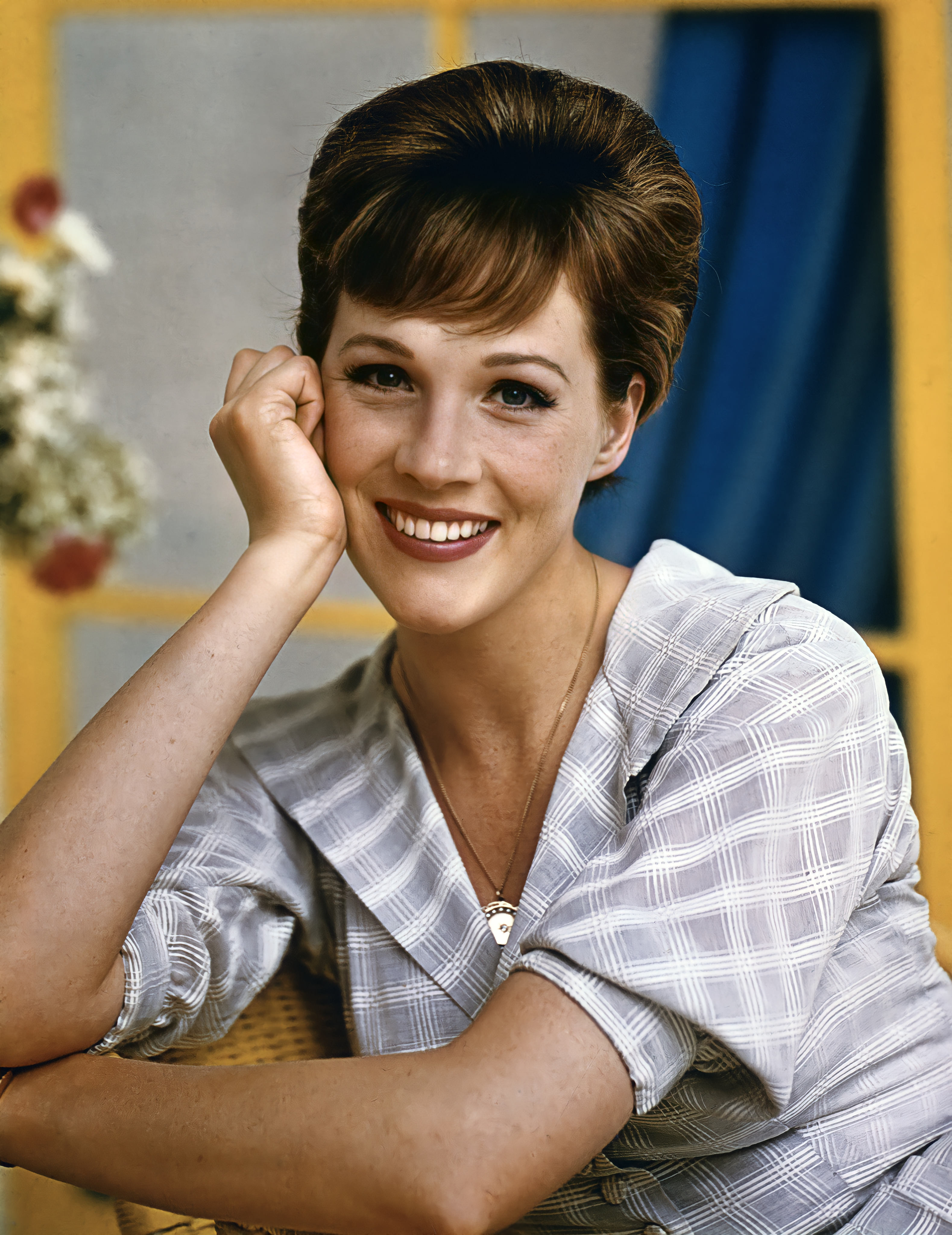
During her two-year run in Camelot, Andrews was approached by Walt Disney to star in a film musical of the children’s book Mary Poppins. At the time, she was expecting her first child, but Disney was willing to wait until after her child was born to begin production. Andrews and Walton had a daughter, Emma, in 1962. Andrews had hoped to be cast in the film version of My Fair Lady; she and her many admirers were disappointed when Warner Brothers chose to cast an established film star, Audrey Hepburn, in the role. Publicity surrounding the choice was intense; Hepburn was not a trained singer, and her vocals were dubbed by singer Marni Nixon.
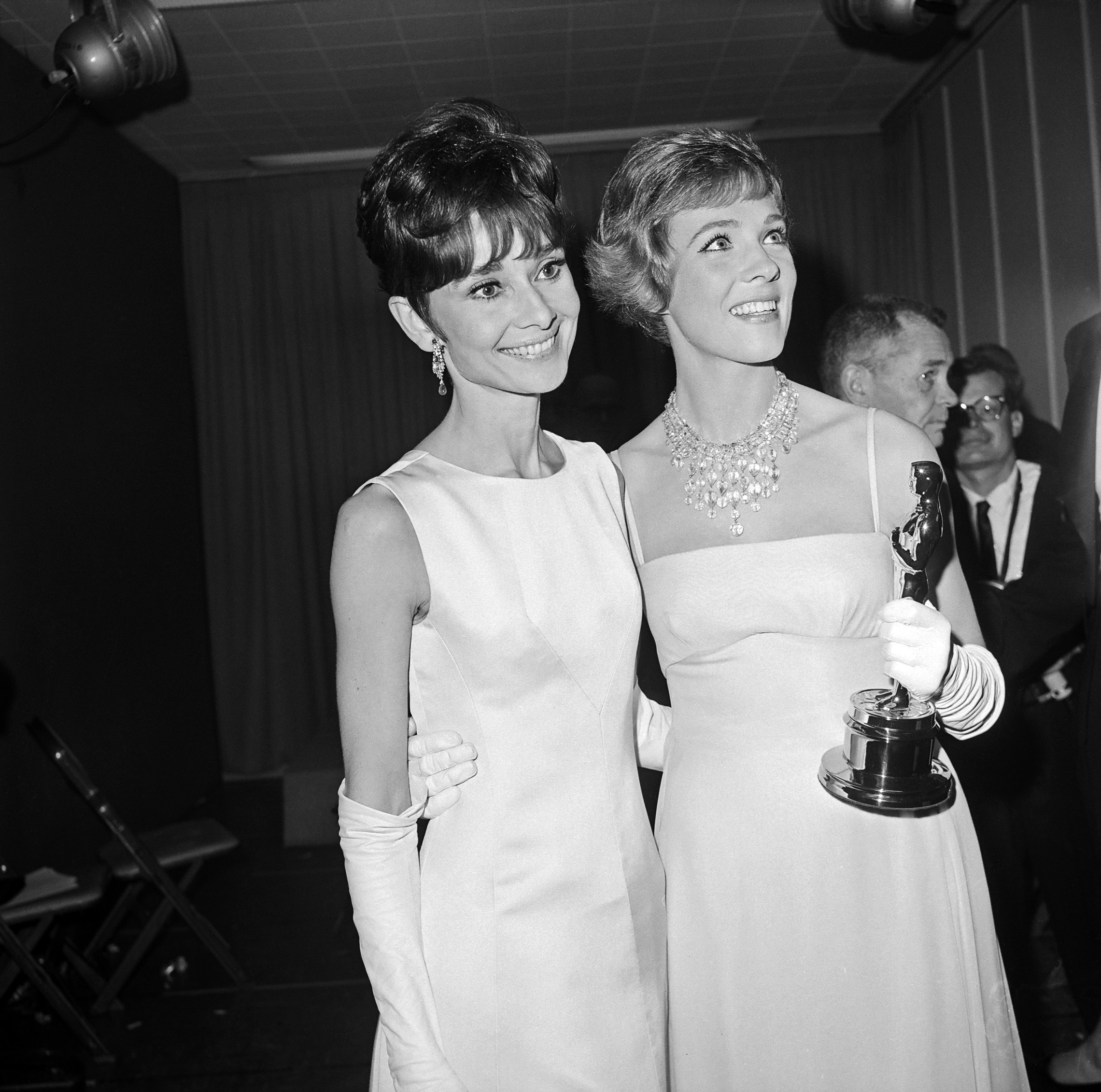
Meanwhile, Julie Andrews set to work on her film for Walt Disney. Mary Poppins was a huge success and immediately established Julie Andrews as an international film star. Her triumph was confirmed when she won the 1964 Best Actress Oscar for her very first film appearance. She followed up this success with her dramatic film debut in the World War II satire The Americanization of Emily with James Garner, who would become a frequent co-star and lifelong friend.
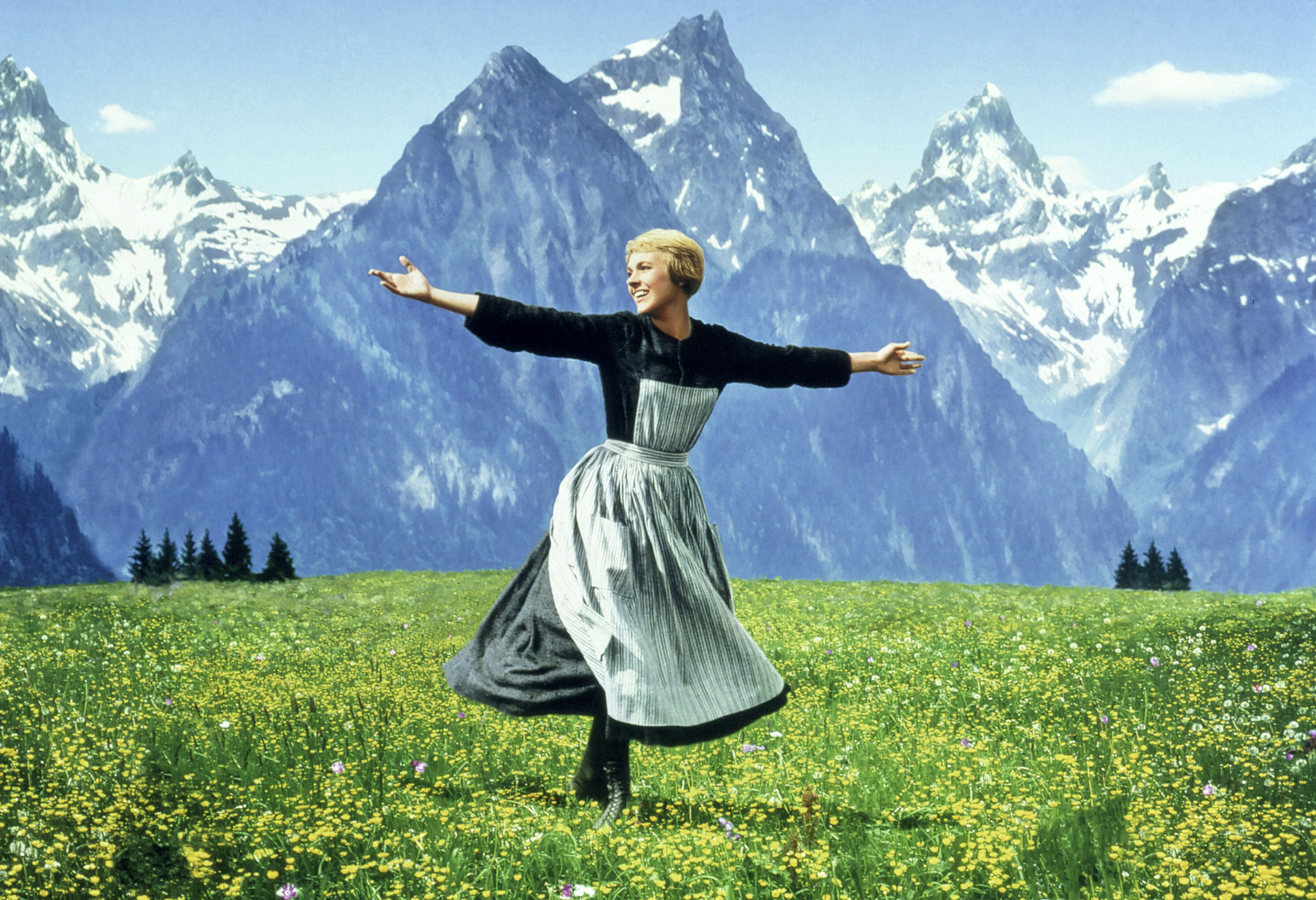
Andrews scored the most spectacular success of her career with the starring role in The Sound of Music, another Broadway musical adaptation and the most successful motion picture made up until that time. Andrews was nominated for an Oscar again, and the film was honored as Best Picture of the Year. It remains a beloved classic. Forty years after its original release, it draws huge crowds to massive outdoor sing-along screenings such as those held in the 25,000-seat Hollywood Bowl. The reigning international film star of the mid-1960s, Andrews starred in the most successful film of 1966, Hawaii, and in the Alfred Hitchcock thriller Torn Curtain with Paul Newman. In 1967, she shone in yet another successful musical, Thoroughly Modern Millie. That same year, her marriage to Tony Walton ended, although the pair remained close friends and have often collaborated in the years since.
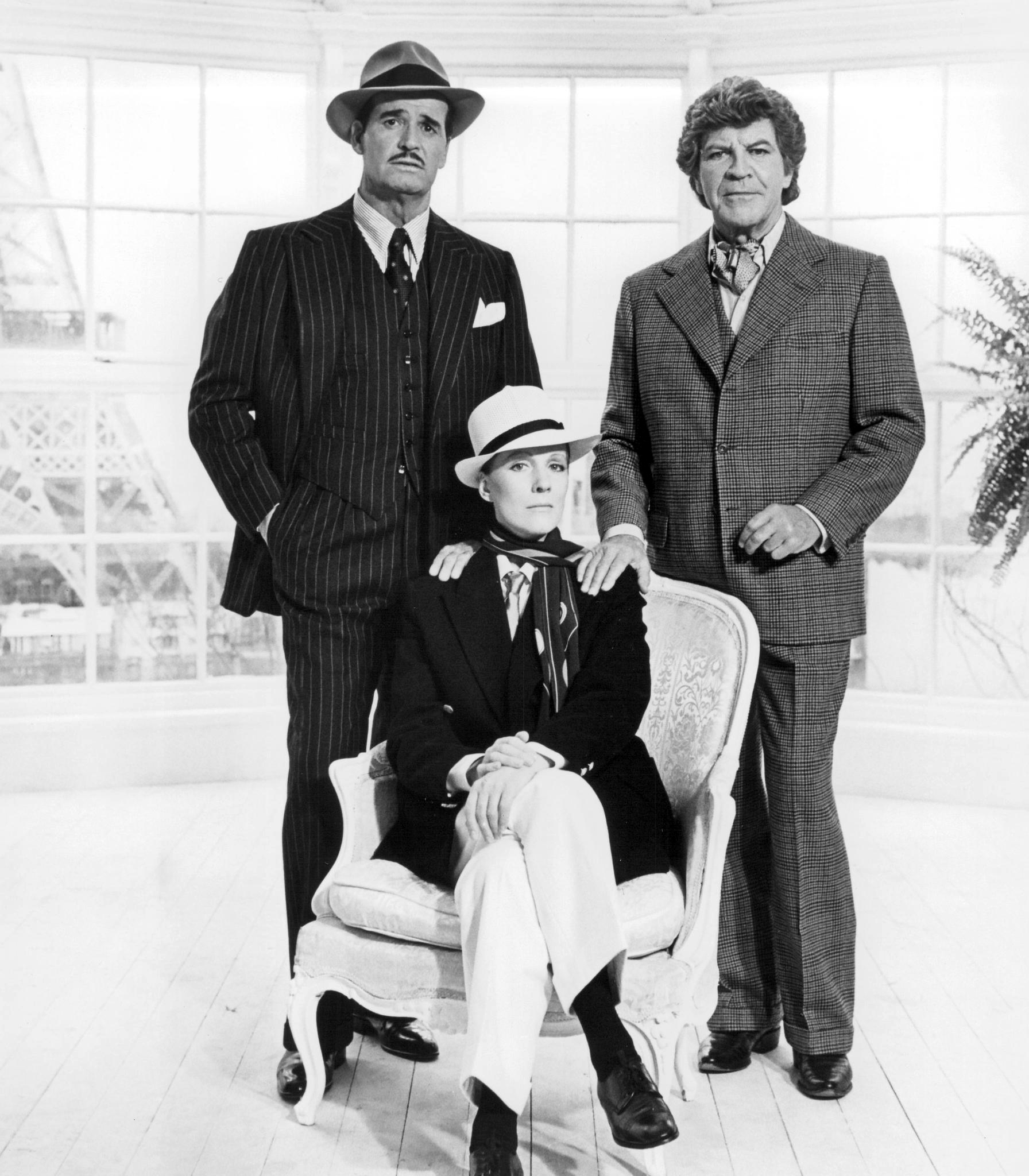
A film biography of the British singer and actress Gertrude Lawrence — Star! — was a box office disappointment. Audiences were turning away from musical films. Her next starring vehicle, a musical spy story of the First World War, Darling Lili, was also a commercial failure, but proved to be a personal success for Andrews on another level. Her first collaboration with director Blake Edwards, it marked the beginning of a 41-year partnership in art and life. Andrews and Edwards were married in 1969. The couple raised his two children from a previous marriage and adopted two more of their own.
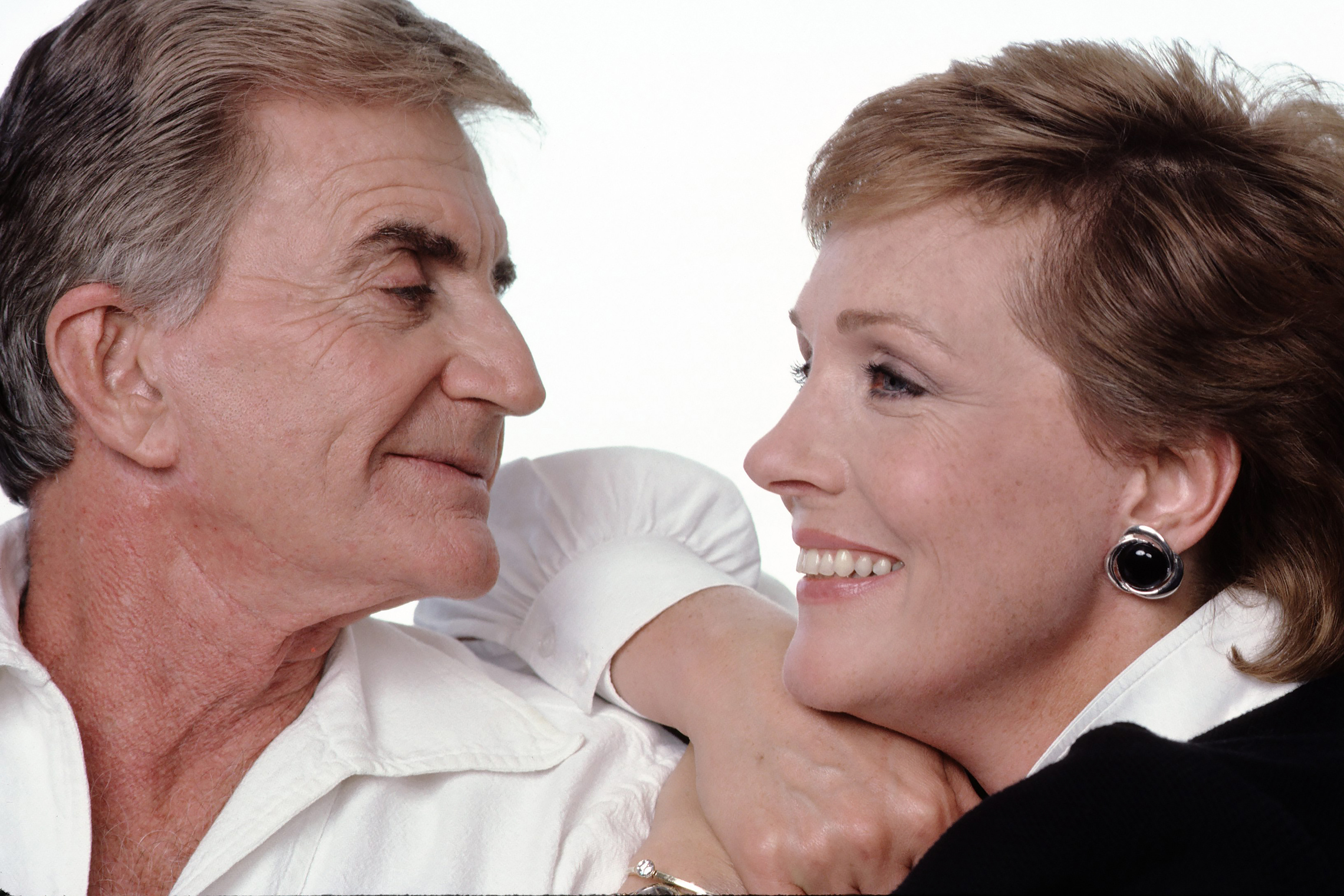
After a number of successful television specials with her friend Carol Burnett, Julie Andrews hosted her own weekly variety show on CBS television in the 1972-73 season. She also enjoyed great success as a concert artist, with appearances at the Royal Albert Hall and the London Palladium. In these years, she also began writing children’s books under her married name, Julie Andrews Edwards. After the success of Mandy (1971) and The Last of the Really Great Whangdoodles (1974), she collaborated with her daughter, educator Emma Walton Hamilton, on Dumpy the Dump Truck and its many sequels, a popular series of books for very small children. Her novels Dragon and Simeon’s Gift introduce young readers to the lore of the Middle Ages. Several of her books have been illustrated by her ex-husband, Tony Walton.
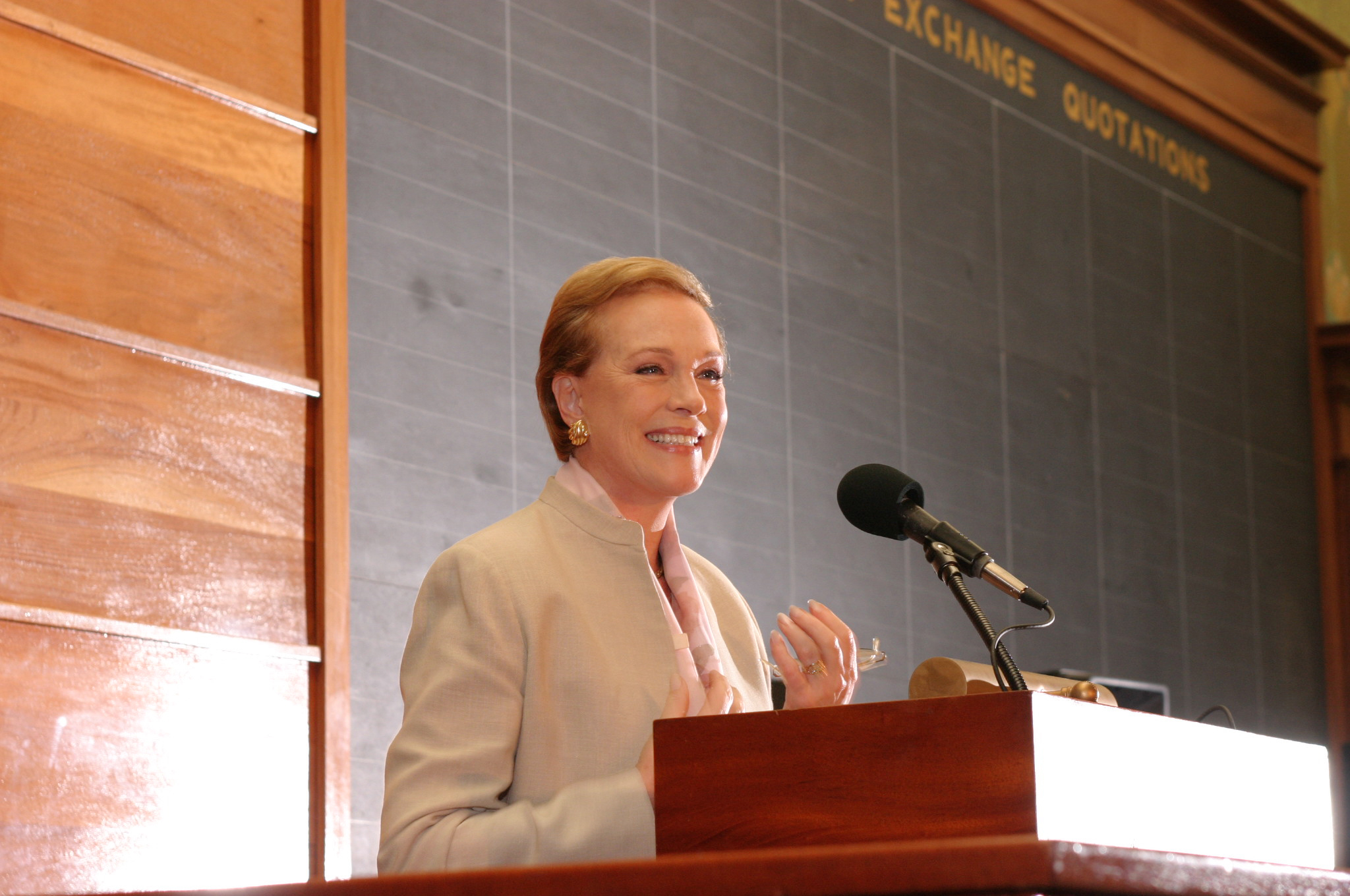
Although Hollywood was no longer producing the kind of musical films that had made her famous, Julie Andrews continued to develop her dramatic talents in a wider variety of roles in the 1970s and ’80s, appearing in a number of films directed by her husband, Blake Edwards, including The Tamarind Seed, 10, S.O.B. and That’s Life. Andrews and Edwards enjoyed a notable success with the 1982 film Victor/Victoria, in which Andrews played a woman who disguises herself as a young man and achieves success on stage as a female impersonator. This comedy of gender confusion struck a chord with international audiences in the 1980s and reunited her with co-star James Garner.
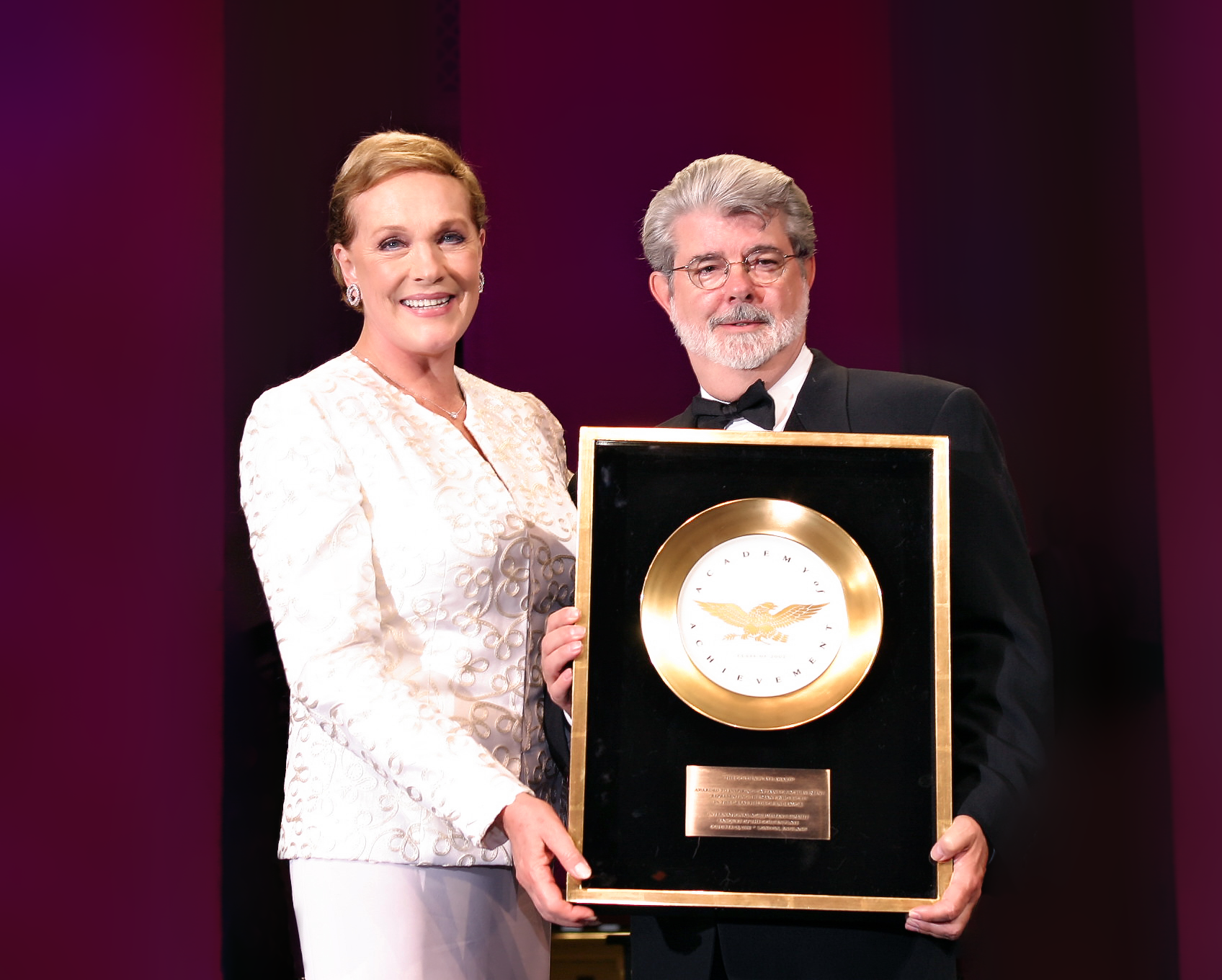
In the 1990s, Andrews became increasingly involved in international charities. Since 1992, she has served as Goodwill Ambassador for the United Nations Development Fund for Women (UNIFEM), which assists women and their communities in impoverished countries. Another favorite charity is Operation USA, a California-based international relief agency.
Andrews returned to the New York theater in 1993 with an appearance in the small ensemble cast of the Stephen Sondheim revue Putting It Together. It was clear that theater audiences wanted more of Julie Andrews, and she brought a stage version of Victor/Victoria to Broadway in 1995. An enormous success with critics and the public, Andrews appeared in the show for two years. After developing vocal problems, due to the growth of ovules on her vocal cords, she sought treatment through surgery, but the operation damaged her larynx irreparably, effectively ending her singing career. Expert opinion concluded that the surgery had been improperly performed and Andrews received a settlement, reported to be as high as $30 million.
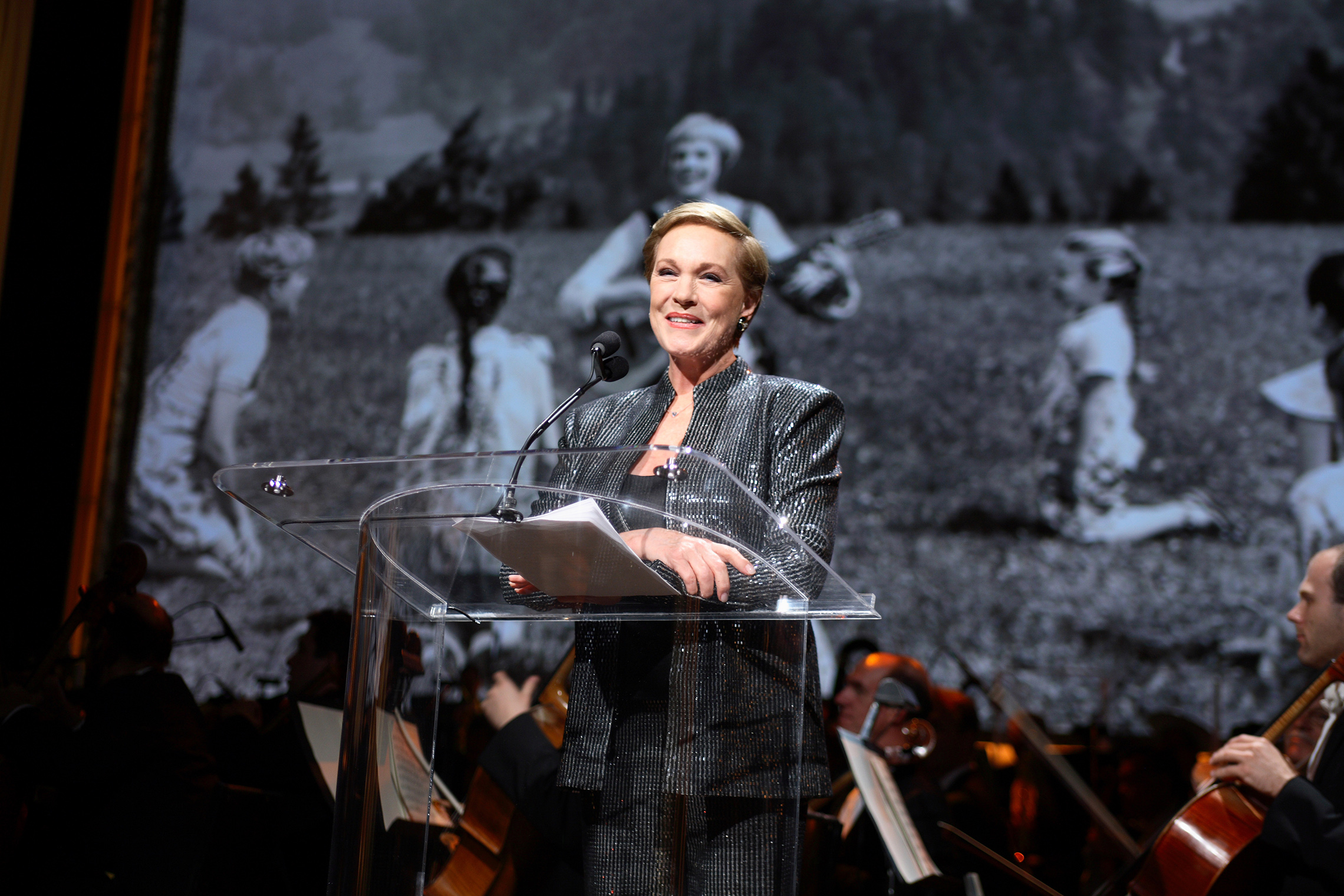
Her speaking voice remained unimpaired, and Andrews has continued her acting career. A new audience discovered Julie Andrews through her role as the Queen in the film The Princess Diaries and its sequel. Her speaking voice has also been heard in the animated Shrek films and in 2010’s Despicable Me. In the sixth decade of her career, Julie Andrews explored still more avenues of the performing arts, directing a successful revival of The Boy Friend, the show that first brought her to America as a teenager. She has continued to act, direct, write and contribute her boundless energy to favorite causes, including Operation USA and Haitian earthquake relief.
In 2008, Andrews published the first volume of her autobiography: Home: A Memoir of My Early Years, recounting her life up until her departure for Hollywood to star in Mary Poppins. The book received excellent reviews and immediately went to the top of The New York Times bestseller list. The same year, she toured the United States in a concert performance with orchestra and backup singers, Julie Andrews: The Gift of Music.
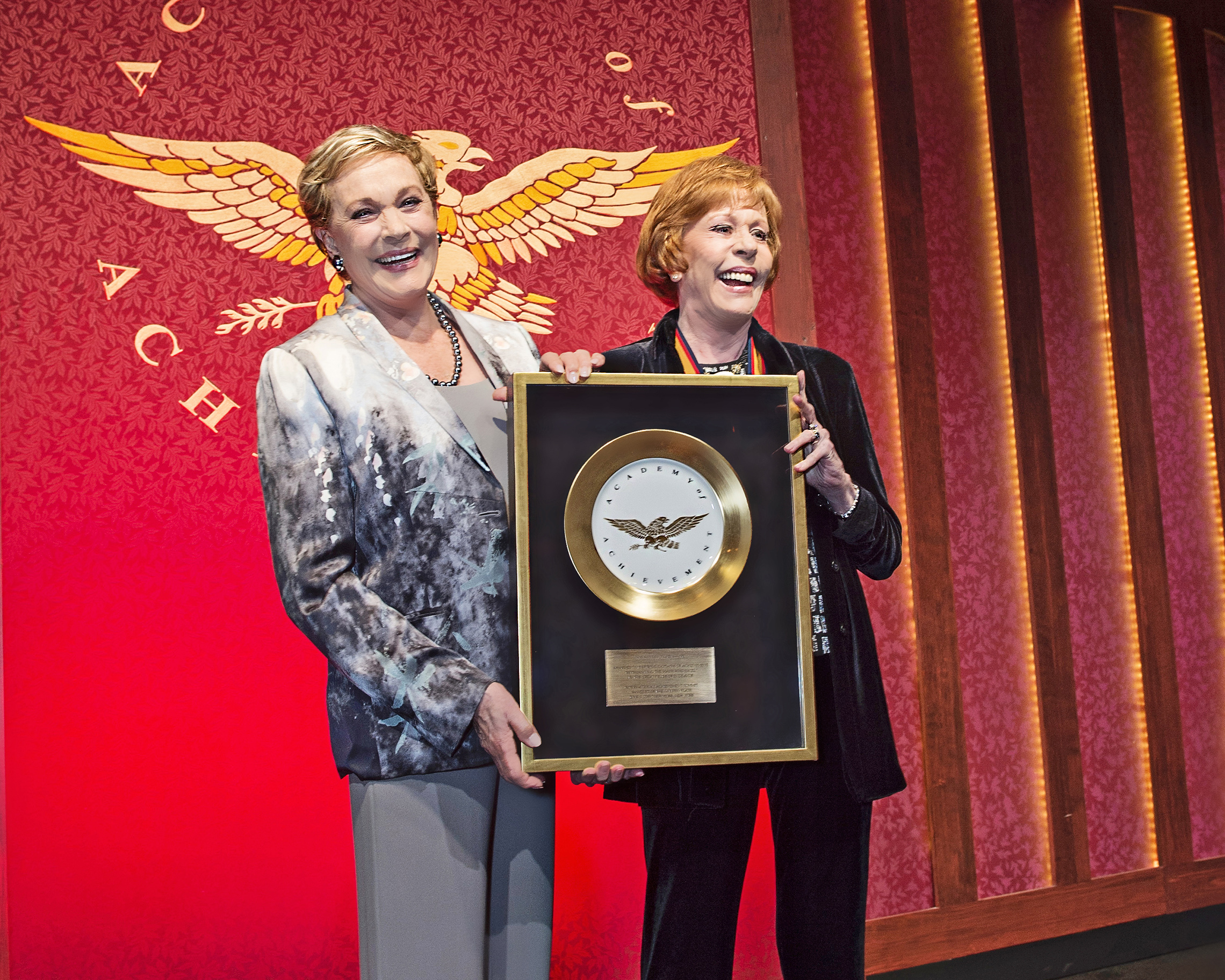
She topped the bestseller lists again in 2010 with her 23rd book, A Very Fairy Princess. The same year saw Julie Andrews back on the big screen in The Tooth Fairy, and marked her return to the London stage for the first time in 21 years, in a performance of Julie Andrews: The Gift of Music at the O2 Arena before 20,000 adoring fans. This triumphant year came to a sad end with the loss of her husband of 41 years, Blake Edwards, shortly before Christmas. Julie Andrews and her children were with Edwards at the time of his death in a Santa Monica hospital. The couple had long maintained homes in Los Angeles and in Gstaad, Switzerland.
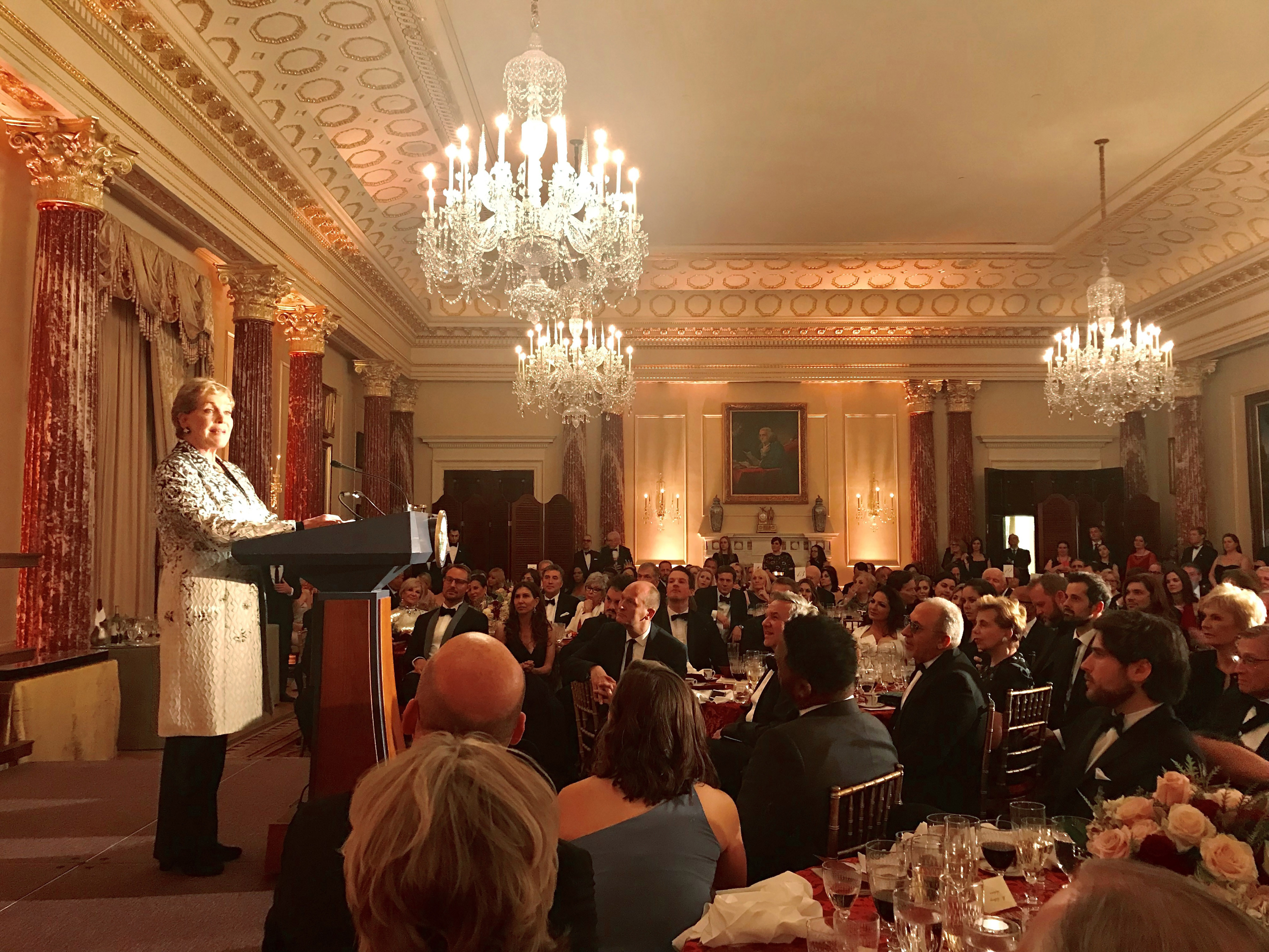
Julie Andrews published a second volume of autobiography, Home Work: A Memoir of My Hollywood Years, in 2019. She continues her alternate career as children’s book author and advocate for literacy and the arts. To date, Andrews and her daughter, Emma Walton Hamilton, have written more than 30 books for children and young adults. In April 2020, as families all over the world sheltered at home to arrest the spread of the COVID-19 virus, American Public Media announced a new weekly podcast series, Julie’s Library, in which Andrews and her daughter read their favorite children’s books aloud, with music, sound effects and special guests. Andrews hopes these podcasts will “bring the comfort of storytelling to families during these unprecedented times.”

One of the most beloved performers in the world, Julie Andrews made her Broadway debut at age 18 in The Boy Friend. Historic successes followed in the original productions of My Fair Lady and Camelot. She won the Oscar for Best Actress in her first film, playing the title role in Mary Poppins. Perhaps the greatest triumph of her career came with the leading role in The Sound of Music, one of the most popular motion pictures of all time. Her crystalline singing voice, wholesome appeal, natural elegance and sly humor made her a top box office draw around the world.
In 1989, she became the first actress to receive the special Tribute Award of the British Academy for Film and Television. Over the course of her career she has also won five Golden Globe Awards, including two for World Film Favorite, and one for her performance in the filmVictor/Victoria, a role she reprised for an acclaimed run on Broadway in 1995. She has enjoyed continued success in films such as The Princess Diaries.
Over 30 years ago, she embarked on a second career as an author of children’s books, includingThe Last of the Really Great Whangdoodles and the popular Dumpy the Dumptruck series. She was named a Dame Commander of the British Empire by Queen Elizabeth II in 2000 in recognition of her extraordinary career and her service to charities such as UNIFEM and Save the Children.
Let’s talk about the original production of My Fair Lady. Where and when did My Fair Lady open?
Julie Andrews: Well, it opened out of town in New Haven on a stormy winter’s night. Great drama. Then it opened in 1956 at the Mark Hellinger Theater in New York City on Broadway.
There were people who thought it was folly to tamper with George Bernard Shaw’s original play, Pygmalion. Did you hear that?
Julie Andrews: I was a little curious about it myself, but I only had to hear the songs to know that Alan Jay Lerner had really done Shaw justice. I believe to this day that these songs just took off where the text of the play finished. And he was a giant. Both Lerner and Loewe, and particularly Moss Hart, who was the director of My Fair Lady. They were giants, and I was lucky enough to be led by gentle giants in every respect in those days.
How old were you when you were cast as Eliza Doolittle? Twenty?
Julie Andrews: Yes, I was. I was 21 not too long after My Fair Lady opened, yes.
When you first looked at that script for your audition, did you know this was something extraordinary?
Julie Andrews: No. Actually what happened was…
I sang for Lerner and Loewe first and belted out my audition song and a couple of others, and then went in to start reading from the original Pygmalion because the script wasn’t quite finished. And, I knew that I was hopelessly out of my depth. You have to remember I was raised in vaudeville. I wasn’t even on the right side of the tracks. I wasn’t in legit theater at all. I had never done a play other than this very, very light piece called The Boy Friend. And so I really knew from nothing. And I knew that I understood Eliza in some way but I was hugely shy, hugely insecure and I wondered if anybody would know that there was something inside that they could use if they knew how to get it out for me.
What was your audition like?
Julie Andrews: Pretty awful, I would imagine. There I was, singing something like — if memory serves — it was something like the waltz song from Tom Jones or something, an excruciatingly high big note, which I belted out as loudly as I could, and a lot of coloratura. But I guess they figured I had the voice for it, now if only I could act. And that’s what Moss Hart gave me.

It was extremely daring for them to take a risk that you could act and that Rex Harrison could get by without singing.
Julie Andrews: Rex, I think, they were much more sure about. He couldn’t sing, but he had an innate musicality which enabled him to kind of do a sing-speak sound, which was great and exactly right because it blended straight out of dialogue into song.
I was absolutely atrocious at all the early readings and poor Rex Harrison wondered what on Earth he had been landed with, this young girl that could sing and had not a clue how to get into the arc of a character. I had no idea how to develop a character at all. He intimidated me tremendously because he was so, so good. He was also very, very nervous and very, very demanding and selfish because he was scared to death because he had never sung before. So, I knew I could pull off all the singing stuff and he, for sure, knew he could pull off all the dialogue, but he wasn’t about to give anybody else any time and I know that Stanley Holloway, who played Doolittle, also had problems and was waiting for his sort of fleshing out of the character. And Moss took me for a long weekend and dismissed the entire company and worked with me in the most brilliant way.
He sounds like a great man.
Julie Andrews: Lovely man, and I credit him with all that I am today, because had it not been for Moss I probably would have gone back to England.
I think that probably Moss, of all people — I’ve read Moss’s wonderful biography, Act One, and if you read that you have to say what a generous sweet man he was. He came from extremely humble beginnings himself. And I think any other producer would have sent me home. I had a feeling that if I didn’t cut it that weekend that I probably would have been on a plane back to London. But Moss was a very kind man and covered it by wit and sophistication, and all of the things that he’d acquired. But basically, I think, he must have sensed and identified with my early pain and fear because he’d had it, too. And, he was kind. It’s as simple as that. He wanted to, and maybe he was perceptive enough to see — maybe I didn’t know, but there was something that they felt was there and I certainly didn’t — but he certainly seemed to feel that it was there.
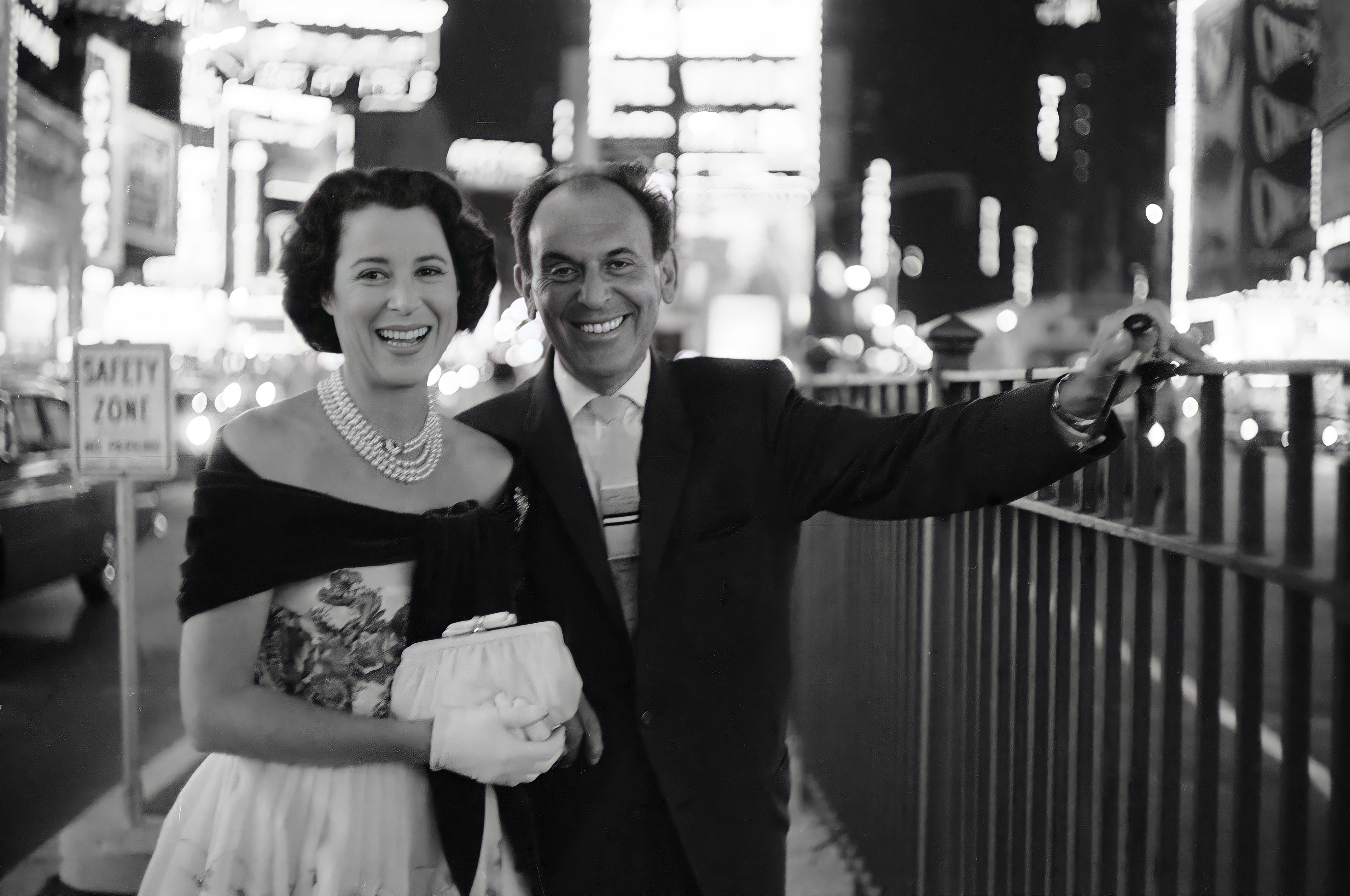
What did Moss Hart get you to do in that weekend that you hadn’t been doing?
Julie Andrews: Moss Hart really just helped me find Eliza and he demonstrated. He said, “No, no, no, you’re acting like a school girl,” or “That’s better, that’s better,” you know. It’s hard to say what he did. He created pictures in my head. He helped me understand some of Eliza’s dilemma. I don’t know which was the hardest part, the first half or the second half because they were both very hard. I was struggling with the Cockney accent. I’m not great at accents, believe it or not. Even though I have a good ear for things, I don’t have a great ear for accents. But I was struggling with that, too. He just helped me see what courage this young lady had. Eliza Doolittle that is. We rehearsed on the roof of the New Amsterdam Theatre, which in those days was the scruffiest, dirtiest place. That’s the theater where all the Ziegfeld Follies had been, and there was this great nightclub up above that had gone into terrible disrepair. Anyway, I knew going down to the New Amsterdam that I was in for an awful time.
It was a little bit like going to the dentist. You knew it was going to be very painful, but if you could stick it out, maybe with luck you’d come out feeling a heck of a lot better. And that’s what Moss [Hart] did for me. It was painful. And he said, “We have no time for embarrassment. We have no time for anything but the blunt truth.” And he shaped, pushed, cajoled, wheedled, loved me, yelled at me, just helped me become Eliza Doolittle. And although by the following Monday, I’m sure I retreated 50 percent, I had gained 50 percent and it gave me the foundation from which to really start working on the role. And I played My Fair Lady for three-and-a-half years. And Alan Lerner once said that he felt that a long run in a very good role was more help to a performer than doing repertory with lots and lots of short roles. You might become very facile, but what I did was learn what did get a laugh, what didn’t get a laugh, and why I didn’t get it if I didn’t get it. What the difference was in terms of it raining outside or snowing or an audience that was coughing their hearts out or one that was too hot in the seasons, when your leading man has a headache or when you have a voice that’s hanging on by a thread. I think I learned in My Fair Lady everything that set me up in later years in good stead because I really learned how to preserve and take care of myself and I was learning on my feet every single performance.
It played havoc with me physically because three-and-a-half years is a very long time. It was like a long tunnel. I did get a break between England and America, but it wasn’t that long.
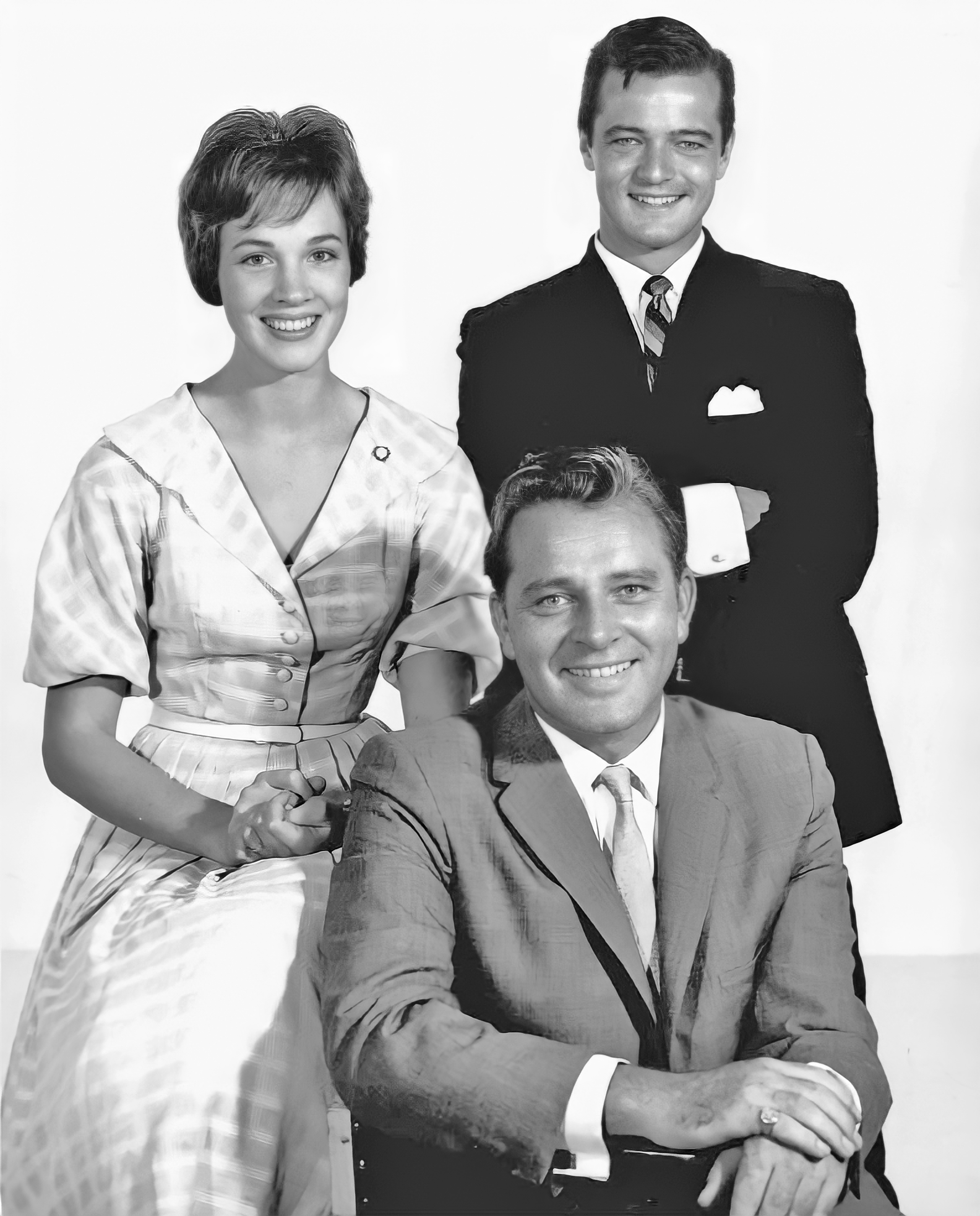
You were passed over for the film of My Fair Lady, and then made a fantastic screen debut in Mary Poppins. How did that all come about?
Julie Andrews: Again, the good fortune in my life suddenly came along. After My Fair Lady I was very lucky to do Camelot for Lerner and Loewe with the wondrous Richard Burton. By now I was married to Tony Walton and I did know my way around Broadway, and I knew a little bit more about performing, and everybody trusted me and I wasn’t quite so desperately shy.
My Fair Lady was bought by Jack Warner to be made into a movie. I didn’t think I’d get it. Alan Jay Lerner and Moss Hart, I believe, hoped that I would. Rex [Harrison] certainly was going to make it. But I understood very well when they cast Audrey Hepburn in the role because, although by then I was a fairly big name in the small pond that is Broadway, I certainly wasn’t known across America, and I certainly had never made a movie. So I didn’t get the role of My Fair Lady in the film and, lo and behold, I was in Camelot and Walt Disney came to see Camelot. He was advised to see it because he was putting together this movie of Mary Poppins. He came backstage afterwards. I thought he was just going to visit. And he said would I like to come to Broadway — sorry, to Hollywood. I was on Broadway. Would I like to come to Hollywood to see the drawings, the designs, the art, hear the songs and the lyrics for this musical of an English book, Mary Poppins, that he was doing.
And he turned to Tony Walton and said, “And what do you do, young man?” Tony was, and is, a designer of theater and film. A wonderful designer of sets and costumes, but he had done very, very little at that time and he explained this to Walt. And Walt said, “Well, then you better bring your portfolio with you when you both come.” Oh, and I was just a teeny pregnant, like about two to three months pregnant. And I said, “But I’m going to have a baby, Mr. Disney.” He said, “It’s okay. We’ll wait.” And so…
Tony and I went to Hollywood and Walt showed us everything to do with Mary Poppins and also wined and dined us so sumptuously and so wonderfully. And, it was such an easy thing to do to say, “Yes, thank you, Mr. Disney. I would love to do that movie,” because everything seemed to come full circle, because all the stuff in Poppins had that rum-ti-tum quality of being vaudeville. And all of a sudden I thought, “Right, I’m home because this I can embrace and perhaps bring something to.” And again, in the kindest hands possible, I was taught how to make a movie and that was the beginning of that. How lucky can anybody get losing out on My Fair Lady and three months later being asked to do Mary Poppins?
To this day a lot of your fans are upset that you weren’t in that movie, but it sounds like you made your peace with it.
Julie Andrews: I did make my peace with it. That isn’t to say that years later I didn’t wish that somewhere, somehow I had put down My Fair Lady definitively, just so that my children or my grandchildren could see it. But in the great scheme of things I ain’t complaining one bit.
What was it like winning the Oscar?
Julie Andrews: I honestly didn’t think I would. I really thought Anne Bancroft was going to get it that year for The Pumpkin Eater. She was superb in that movie. And Poppins was my first film. I never dreamed I would get it. Actually, when I did get that Oscar I really felt that it was more because I had missed out on My Fair Lady, that Hollywood was (a) saying welcome and (b) saying how sorry they were that I didn’t get it. In the speech that I gave I said, “I always knew Americans were generous but this is absolutely ridiculous,” and I really felt that it was generosity and their saying, “Welcome, welcome.”
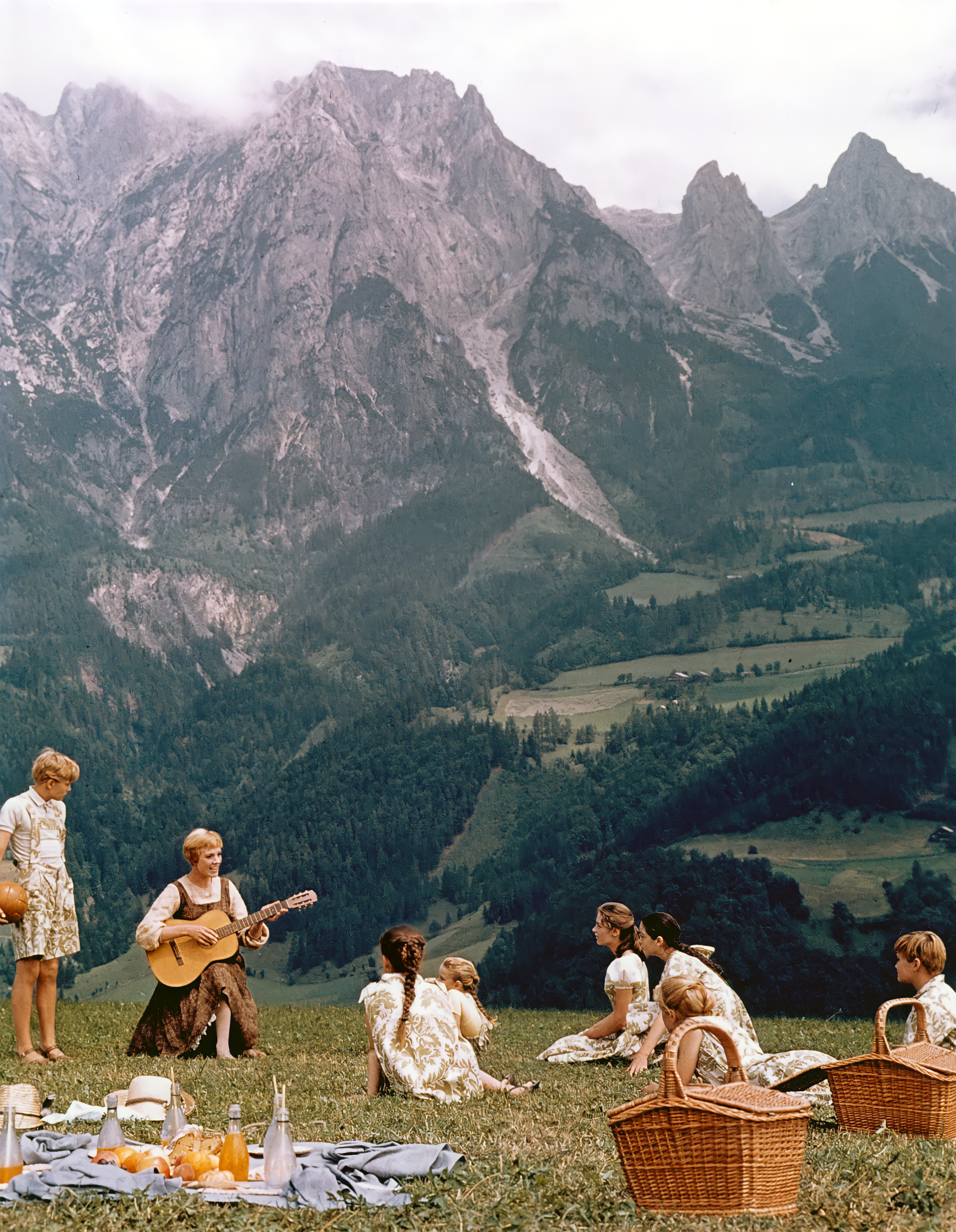
Your movie The Sound of Music has become a classic. Was it clear to you that this was going to be a great piece of work when you first encountered it?
Julie Andrews: When I was first asked if I would like to do Sound of Music, I was very thrilled to be asked and very glad that I was going to do the movie, but was a little careful about certain aspects of it because it was tremendously saccharine, on Broadway particularly, and it seemed to me that if we weren’t careful with the real scenery and with everything else that was going into it, it could be horribly sugary. And I certainly made every effort to make it more astringent, and the great Christopher Plummer contributed so much in that respect. It was his performance that was the glue, the vinegar that held the film together. And then Robert Wise, who was again an adorable man, our director, and he taught me a great deal about filmmaking because Mary Poppins was the first film I ever made, and then I made one called The Americanization of Emily, but by the time I got to Sound of Music I was probably getting full of a lot of little tricks and things that I didn’t know I was doing, and Bob said, “Don’t do that. Don’t do that. Do that.” And I really learned a little bit more about filmmaking.
Let’s go back to the beginning. Could you tell us about Walton-on-Thames? What was that like when you were growing up?
Julie Andrews: Walton-on-Thames, Surrey, which is where I was born, is about 20 miles south-southwest of London, and when I was very young it was just a country stop on the railway line and it is now part of Greater London and very much suburbia. And I know the ins and outs of it, but there are very few places that you recognize in terms of the way it used to be. But, it’s a very sweet place. It’s sort of the middle village between a very up-market village and a very low, poverty village, at least in the early days.
What did your parents do?
Julie Andrews: My real father was a school teacher. He taught practical crafts and English and math. My mother remarried when I was about four or five years old, so I then went to live with my mum and stepfather, and he was a fine tenor, he had a singing voice. He was from Canada, from Toronto. He joined forces in more ways than one with my mother in that she was a really wonderful pianist and probably should have been a performing concert pianist but, in fact, due to circumstances and the war and tremendous poverty and things like that, they became part of a vaudeville act. And consequently, I knew nothing else but that, and to their amazement, I think, they discovered when I was about eight years old — my stepfather, I think in an attempt to become a little closer to me, decided to give me some singing lessons because my school had closed down because of the escalation of the war. And, I think he thought it would just sort of “keep me quiet,” so to speak. And, they discovered that I had this four-octave soprano voice, which surprised them since it was my stepfather who sang, not my real dad at all. And so, I knew nothing but vaudeville — music hall — gradually began to appear with my mum and my stepdad and tour the halls, and made a fairly important, for me, debut when I was about 12 years old.
Before we get to the debut, is it true that you made an appearance on stage at age two?
Julie Andrews: You’ve done your homework! Yes, my mother was the pianist. My aunt was a dancer and they were two extraordinary ladies. I’d love to write about them one day. My aunt founded a dancing school, which she ran for almost 50 years in Walton-on-Thames. She would put on her local shows and that was when I think I made my real first debut. I think I was either Winken, Blinken or Nod, one of the three.
No speaking role?
Julie Andrews: No speaking role but probably a lot of bouncing about in a baby suit of some kind.
So really there was never a time that you weren’t on stage?
Julie Andrews: Not really. I enjoyed it immensely.
You mentioned that at 12 you had an important stage debut. That was a very successful show, wasn’t it?
Julie Andrews: Well, it was a sophisticated London revue and it was at a theater which is no longer there. It was called the London Hippodrome, and it’s now just a sort of nightclub in Lester Square, London. But, it was a very beautiful theater and I was literally the smallest person on the bill. And because it was so sophisticated, the producers thought perhaps it wasn’t right that I would be singing in this show and the night before we opened they decided that they couldn’t use me. And, of course, my mom being somewhat of a stage mum, sort of said, “No, you can’t do this to this child. It’s her great debut,” and so on. And so, she and my stepfather and their agent descended on the poor producer and they said, “She’ll sing a much more difficult song and you’ll see.” And so, I auditioned for a much more difficult song and the end result was that I was in the show, stayed in the show, and on opening night the audience went crazy, and it was a complete standing ovation. The first thing I had ever really done. The first time I had ever really tried anything that important. And, the press followed me home. You know, the kind of thing when you’re a young fluke in a way, and that was the beginning of a very busy few years right through my teens of touring and radio and early, early television and so on.
What was the name of that show?
Julie Andrews: The name of the show at the London Hippodrome was Starlight Roof. And it starred English performers: Vic Oliver, Fred Emney, Pat Kirkwood, all very talented. Patricia Kirkwood was a very glorious looking lady with wonderful long legs. She was the leading lady in every sense.
You mentioned that the schools had shut down during the war. Does that mean there was really no school to go to?
Julie Andrews: Yes. There was a lot of evacuation going on at that time. All the children were being evacuated into the country. I was, too, for a while. The air raids towards the end of the war particularly were coming so fast and furiously — with the doodlebugs (buzz bombs) as we called them — that no housewife could get anything done and everything just ground to a halt for a while.
And then, were you eight when you met another voice teacher?
Julie Andrews: Yes. My stepfather was very smart, in that he knew he didn’t have the ability to teach, and because it was such a very young voice, but such a sort of oddly powerful one, he knew that he had to put me in good hands if he could. And so, he took me to his teacher who was a very fine dramatic soprano, an English dramatic soprano. She’d done a lot of Handel. I can’t even think of the right word at this point. But, she was a very gentle woman and I was with her for most of my early life. Only when I went to Broadway did I kind of not work with her, and of course I prepared with her to go to Broadway, but she didn’t actually come with me. But, the foundation that she gave me and the technique — the technical foundation — was terrific.
What was her name? Did she have anything to do with the diction that you’re famous for?
Julie Andrews: Her name was Lillian Stiles-Allen and she had an extraordinary voice. A voice much like Kirsten Flagstad or Birgit Nilsson, that wonderful kind of fluted sound that comes out of those extraordinary dramatic sopranos. She firmly believed — and taught me — that your voice would hold up for you if you were true to your words. She said there could be people in the audience that needed to see what you were saying, because maybe they were hearing impaired in some way. But more than anything, she said if you relied on those words the voice would come through for you. In other words, be true to your vowels, be true to the consonants that were strong, and not in a kind of glottal way but just really use them as stepping stones to a good foundation for a voice. She was absolutely right.
What else did she teach you?
Julie Andrews: I sang in those days a lot of sort of opera and operetta. I felt that I knew, and I believe that I was right, that I really didn’t have the voice for it. My own voice was very white, very, very thin, and I was able to do these incredible sort of gymnastics with it, tremendous sort of calisthenics, but in a coloratura way, and it was so high that dogs for miles around would howl when I took some of the high notes on. But, she gave me the groundwork of opera and she always said, “Go beyond your reach. If you’re doing something light, practice something even more difficult. Practice it a tone up so that when the night comes and you have to sing it, it is so within your range.” And for many, many years I did that.
That’s sounds like a baseball player who practices batting with two bats so when he’s holding one it’s very light.
Julie Andrews: Exactly. Yes, very similar.
At this point were you still close to your real father?
Julie Andrews: Oh, yes.
What did he teach you?
Julie Andrews: My dad was a very special human being. He had an innate decency. It didn’t come from…he was very bright. He was a nature-loving man. He treated all of us in the family — including his first wife’s other children — he treated us all the same, and as beloved equals. And, we knew he was special. I mean, obviously any dad to a young girl is special if he does all the right things, and my dad certainly did, but he’s the one that instilled in me any true reality in my life because on the one side I had this mad upbringing of vaudeville and touring a great deal and very little schooling. My father was the one that took me on nature walks, took me to the swimming baths, taught me how to swim, took me down to the seaside in freezing cold weather and we dipped in the sea. We climbed the local hills, and he gave me a love of books.
What books did he introduce you to?
Julie Andrews: When I went to see him he would read to me and he would pick what he thought would be appropriate. Alice in Wonderland and things like that when I was a child. He would buy books for me. I didn’t see him all that much, strangely enough. Occasionally, for a two-week period in the summer holiday maybe, or a visit over Christmas. Or he’d come for a weekend and take me and we’d get on our bicycles and ride for 15 miles to get to his place. But what he did give me was always exactly right. Just the memory of him sitting and reading to me was enough to make me love listening to books and the spoken and written word.
Other than Alice in Wonderland, are there any books that you truly remember loving as a kid?
Julie Andrews: There was a book that he gave me. It’s interesting that you ask that. Obviously Wind in the Willows, and all the classic children’s books, but there was a little book that we found and he leafed through it, and he said, “Here you are, darling. I think you’ll like this.” And, it was a very small children’s novel called The Little Grey Men, by an English author called “B.B.” And it was a very simple nature tale of the last four gnomes left on this earth in England. Very much like Watership Down, that kind of big nature study, and it was set in four seasons. It was a terrific adventure story. I swallowed it up and it went out of print. And, I subsequently have started my own imprint at Harper Collins and it’s coming out this fall. I’m bringing it back again and I’m absolutely delighted about it. It’s one of our mission statements is to bring back books that are worthy of a revisitation in a way, and this is the first one. And, I write about it as a little chapter before it begins.
You’ve become an author yourself, so that must be the influence of your dad.
Julie Andrews: That book probably influenced me as much as anything, that and my dad. Yes, absolutely. And obviously Dickens and Goldsmith and oh gosh, so many. Jane Austen obviously and the Brontë sisters and so on.
I also loved to scribble as a kid. I loved to write and eventually, because I didn’t have a formal education, a governess was found for me who traveled with me wherever I went, because touring in vaudeville you’re a week in one place, a week in another, and you could not settle into any school. So, I had this wonderful lady who traveled with me who quickly recognized that if she wanted me to do anything, all she had to do was say, “Do this first and then you may write your story,” whatever story I was going to write because that was obviously what I loved to do most of all. She was a very gentle, very kind lady, and I loved her.
What was her name?
Julie Andrews: Her name was Gladys Knight.
She didn’t go on to become a famous soul singer?
Julie Andrews: No, not that one!
It’s interesting that you had a governess and famously played governesses. Mary Poppins and Maria von Trapp. You knew what it was like to be a governess.
Julie Andrews: She wasn’t that kind of a governess. She was a lot older. Sort of a retired teacher who then became a private tutor. Nevertheless, I guess I must have picked up a few things from her, yes.
Did you ever miss having a normal education and a normal childhood?
Julie Andrews: Yes, I did. I was too foolish in my teens and too busy to fight for it. My mother said, “I think we’ll probably quit school, you’re going to get a much bigger education out there,” and indeed I did, of a sort, but especially as I got older, I really regretted not having a college education. I would have loved that.
There’s also the socialization value of being with other kids.
Julie Andrews: Yes. I’m not complaining about it. I have retained some very close friends from my home village, but actually I didn’t have many peers, not young friends in those days. It was all mostly adults because of the touring, because of the vaudeville. But, the kind of education I was getting was that strange one of standing in the wings and watching phenomenal performers performing every week, every night, watching everything from comedians, to jugglers, to animal acts and different kinds of comedians and dancers, and it was extraordinary. I didn’t think I was getting an education at the time. It’s only in retrospect that I realize that that stood me in very good stead in my later years.
You also made a television debut in your teens too, didn’t you? Wasn’t there a show with Stanley Holloway in 1949?
Julie Andrews: On TV or radio? That’s a very good question. The Stanley Holloway one I don’t remember, not until My Fair Lady, when we worked together on Broadway. But I did quite a lot of radio shows, and I did do some very early TV shows but I can’t actually remember specifically what they were.
It was very early for the history of television as well.
Julie Andrews: It was.
Is it true that you supported your parents financially for a while after they retired?
Julie Andrews: Yes, I did. We all came from such humble beginnings. It’s amazing. It has always staggered me. I wish I could write about it one day. I’d like to try.
My mother made such a quantum leap from her extremely humble beginnings to being considered — certainly in our local village — fairly big-time for being on radio and touring as she did, and playing the piano so beautifully. And then the next leap that I made, and in like three generations. It’s hard to imagine that it’s possible, but it was because my mother really came from — her mother was just a “below-stairs” maid at the local big mansion, and I don’t think in her lifetime saw any wealth of any kind, and worked continuously and hard. Her father was a manager of one of the coal mines up in the north of England and he was a pit manager, albeit a talented man, somewhat of a poet and a musician. He played the piano very well also and taught my mother to play in the early years.
Were there any singers?
Julie Andrews: No, that’s the extraordinary thing. I do not know where that came from, but I’m very glad it did.
We all are.
Julie Andrews: Yes, thank you.
Could you tell us about how you came to be cast in The Boy Friend and the impact that had on your career? You were performing in the pantomime Cinderella, weren’t you?
Julie Andrews: Yes. By now I had toured England, endlessly, and I had done a lot of Christmas shows, which in England are called pantomimes. I’m not sure how many Americans are aware of English pantomime. It’s a rip-roaring Christmas festival, usually based on one of the great fairy stories, like Cinderella, Jack in the Beanstalk, Red Riding Hood, all the great fairy stories. They throw in music and slapstick and every year they are reworked and revamped to accommodate whatever talent is brought into that particular show.
I had sort of gone as far as I could go and was playing in a very beautiful production of Cinderella at the London Palladium. That was it in those days. That was about as far as one could go, because although Noel Coward and Gertrude Lawrence, and people like that had gone on to write and to perform in many things, other than another man called Ivor Novello, there wasn’t a lot going on in England in my teens. And suddenly…
I was recommended by a very kind woman called Hattie Jakes, who appeared in one of my radio series — recommended that the director of The Boy Friend come and see me in Cinderella. The Boy Friend was a hugely popular English show that had been running in London for about a year. It was sort of a little, light, frothy musical, a sort of pastiche of the 1920s. And they were going to take it to Broadway with a brand new company. They weren’t going to touch the original English company because they were doing too well and still selling to packed houses. So, the director of the English Boy Friend came to see me and subsequently brought the American producer, and I was asked if I would like to come to Broadway to be in The Boy Friend.
This was Cy Feuer?
Julie Andrews: Cy Feuer, yes. And Ernie Martin was his partner.
Did they already have big names on the stage?
Julie Andrews: Oh yes, they did. They had done Guys and Dolls. They did Can-Can and Silk Stockings.
So this was a huge break for you?
Julie Andrews: It was a huge break. I didn’t truly recognize how big it was. I was more terrified at leaving my family. I had an awful separation anxiety about leaving home, because I always was leaving home and rushing back — if I could — weekends. And they were offering me a two-year contract at an incredibly small salary. There were a great many other English performers going as well, because other than one or two Americans it was an English company. All the company should have had English accents, and so it was necessary that they be English.
How old were you?
Julie Andrews: I was 18. I was 19 the day after we opened on Broadway. And, it’s the first time I had ever really been away from my family for that potential length of time, and suddenly I got so panicked about it, and I called my dad, my real dad. And, I said, “Oh god, daddy, they’re asking me to go for two years. What should I do? I don’t think I can be away from the family for that long.” And he said, “Well chick, it could run two weeks or two months. It might not be two years, and it would open up your head to such an extent, I think you should do it.” I asked him later in life whether that was a hard thing to do and he said it was one of the hardest things, to say, “Go,” to just throw me into the bigger pond, so to speak, and hope that I would swim. And of course, because dad said it, oh, he said a wonderful thing. When I said, “But how will I know what to do?” he said, “Your own good brain will tell you what to do when the time comes,” which was hugely flattering and kind of implied that he thought I could cope. So, I took my courage in both hands and said, “I would like to accept this contract but I will not go for longer than one year.” And lo and behold, Messrs, Feuer and Martin said, “Fine.” And, I was the only one of the company that had a one-year contract, so off I went to Broadway for a year of incredible learning and education.
Doing The Boy Friend on Broadway led to other things of course. Is that what really made your name here in the U.S. too?
Julie Andrews: My life has been so fortunate. I have had most extraordinary good fortune in my life. I sort of put it into three categories, the three major stepping stones. One being that opening night when I was 12, when it started my career. The second being going to Broadway. And the third going to Hollywood. Each one of those happened under the most extraordinary circumstances.
What happened with The Boy Friend was that because I said I would only do it for one year, just before I was going to leave to go back to my family in England — and The Boy Friend was a huge success, and it did sort of begin to help my career tremendously, I mean I think people on Broadway certainly began to know my name a little bit — but I got a call about two weeks before I was due to leave. And, it was a man who said, “I’m the manager of two writers called Lerner and Loewe, who are doing a new musical of Bernard Shaw’s Pygmalion, and could you just answer me one question? How much longer are you in The Boy Friend?” And I said, “Oh, I’m going home in two weeks.” And, he said, “Oh my! I was convinced, as was everybody else, that you had a two-year contract and I said to the guys, ‘Well, let me make a phone call. It’ll only cost a dime.’ ” And because I only signed for one year, I was able to audition for My Fair Lady, and by the most extraordinary good fortune I was able to do My Fair Lady, and that’s really when I think my life just took off in all directions.
Eliza in My Fair Lady is an extraordinarily demanding role. It’s hard to find an actress that can look the part and sing, and act the whole transformation she goes through.
Julie Andrews: And also that can sustain the yelling and screaming and the Cockney accent, and the rage that comes in the first two or three songs, and then pure, pure singing in things like “I Could Have Danced All Night.” Plus the big dramatic role, too, as you say.
It’s a great role.
Julie Andrews: It is probably one of the best roles for a lady in musical theater. That and perhaps Gypsy. There’s a few others. Sweeney Todd is pretty heavy, I would imagine, for all the principals.
But Eliza evolves so dramatically.
Julie Andrews: It’s the best Cinderella story really, yes.
What was it like to do that role eight times a week for two years. What a discipline!
Julie Andrews: It was a discipline. And when I finished it was like, “Well now, what to do with my life? I have no life.” Because it is in a way like becoming a nun or just disappearing into this long tunnel. Wednesdays always seemed very black to me. Black Wednesday was the day that you had two shows and got up feeling awful on Thursday and had to pull yourself up only to be slammed back into the Saturday matinee again, because they were exhausting. It is one of the hardest roles, My Fair Lady. I don’t think I know any of the Eliza Doolittles that truly survived vocally or physically. It took its toll on all of them.
You got married after doing My Fair Lady in London. How did you meet your first husband?
Julie Andrews: I met my first husband, Tony Walton, long before I became anybody. I had just made that first debut at 12 years old, and he was 13 at the time, and he came to see me in one of those English pantomimes at Christmas. It was the first pantomime I ever did, and I played the egg in Humpty Dumpty, and he was sitting there in the front row. And lo and behold, got on the train going home and got off at the same station and said, “You’re from Walton? I’m from Walton.” And Tony Walton, which is his name, is not linked with the town but it just happened to be similar. And, he said, “Where do you live?” And I thought, “Oh, I will be very clever.” And I said, “Oh, the other side of the bridge.” So he then went and looked up all the Andrews that lived the other side of the bridge in this area and, lo and behold, about two days later there was a knock on my door and he arrived with his brothers and we became firm friends, and eventually Tony and I married. We have a beautiful daughter by that marriage called Emma.
Today you’re married to Blake Edwards. How did the two of you meet?
Julie Andrews: I met Blake in 1967. We both laugh at this. I passed his car and he passed mine on the middle island of Sunset Boulevard on Roxbury Drive. I thought, “That’s a very interesting looking gentleman,” and I presumed he must have thought the same about me in terms of being an interesting looking lady. And lo and behold, a couple of days later it happened again and again. And finally, we were waiting for the traffic to clear on either side of this intersection and he rolled down his window, and I cannot remember which one of us said it but it was sort of, “Are you going to where I just came from?” And we both realized that, being on Roxbury Drive, we had probably both been to see, or were going to see, an analyst. And one of us nodded. I don’t know which one asked the question. And not too long after, I received a phone call asking if he could talk to me about a film, which was a film that we both did together called Darling Lili. It was a huge flop and it was great fun to make, and shortly after Darling Lili we were married.
We’re very interested in how people recover from career setbacks and failures like the one you mentioned. You must have been very well grounded, because there were a couple of failed movies in this period, but you kept going.
Julie Andrews: I think it’s that early training, if anything, in vaudeville for me that gave me any kind of gumption. Touring endlessly around England, doing the second show on a Saturday night in places like Glasgow or Newcastle or Liverpool or Swansea or Cardiff, that’s pretty dicey. I was very, very young. There were days when they would have to turn all the house lights on in the theater because people were hurling beer bottles and things like that. And, there was this determination to get through. My mum was terrific. She would say, “Don’t you dare complain. Don’t you dare say you can’t sing in cigarette smoke,” because in those days you could see it spiraling down the great arcs on to the spotlights on to the stage. Nothing but cigarette smoke in those days. And she would say, “Don’t you dare get a swollen head,” accompanied by great love sometimes. But, all the good stuff that one needs, “Get up and do it. What are you complaining about? You’re so much luckier than most other people,” just absolutely true.
So you never lost hope when some of those movies didn’t do so well?
Julie Andrews: You never set out to make a bad movie. You always hope that you’re making a good one. We’re sad about them, inasmuch as they damage the career. In those days it was important, but not as important as it is today, to keep making success after success after success. It’s terrifying today. You can maybe have one so-so movie but you’ve got to come back with another that’s huge, if possible, and that must be very, very difficult for young talent.
You and Blake Edwards, enjoyed a great success with Victor Victoria in the 1980s.
Julie Andrews: Yes, particularly in all the great cities. Particularly in Chicago and New York, L.A., San Francisco, all the really sophisticated cities. I’m not sure if it was in the middle west. It’s theme was provocative, but actually the underpinning of the theme was about love and being happy with who you are. I had a wonderful time making the film. It was Blake, my lovely Blake, at the peak of his creative talent, and I knew I was in the safest hands possible.
Actually it’s a little daunting to be married to your director because quite often he’ll assume that I know what he wants when I’m simply begging for some small morsel that will get me through. But he’d say, “Oh, that’s fine. Just keep doing it.” But we could talk about it, and we did when we needed to, but actually we’d mostly not talk about it when we went home. We had too many kids. We pooled all our children. He had two. I had my lovely Emma and we subsequently adopted two.
At this point you’ve stopped singing because of a surgery that went awry and it’s a loss to all of us. Is there any chance of your singing again in the future?
Julie Andrews: I remain optimistic but not tremendously so. If I am able to sing again it will be through some miracle operation. There’s a lot of work being done to help singers regain their voices, but in my case I actually lost vocal tissue so it’s very hard for my chords to rub together and I need to replace that tissue. I do have some notes in my voice.
I certainly won’t be able to sing the way I used to, but probably at this vast age that I have now arrived at I couldn’t sing those songs anyway. And, that amazing thing of finding new directions at this time in my life when I never expected to, it was a setback. It was devastating. I miss the music unbelievably, but here am I with a publishing imprint, doing lectures, doing a lot of movies that don’t require singing, still working as hard as ever. In fact, I think I may be even more at work than I used to be, and I simply love it. I couldn’t be happier.
You directed a new production of The Boy Friend recently.
Julie Andrews: I directed my Emma, Tony’s and my daughter, with her husband and her partner, Sybil Burton, Sybil Burton Christopher, in a wonderful little not-for-profit theater in Long Island, and it’s a great theater and I directed there for them and had a ball. And, of course, it was The Boy Friend in which I had begun on Broadway and felt I might be able to contribute something to it and was stunned at the talent that I found and how easy and lovely it felt and Tony Walton did the sets and costumes for it. I was in Emma’s theater and when I said to Emma, “Emma, if I fail for the family, for you, what if it’s not a success? What if it…” She said, “Mom, what better place to try than our theater? You’re in the safest possible hands and we’ll surround you with people who know what they’re doing so that you just do what you do best.” And all of a sudden it turned out to be this wonderful success.
Would you do it again?
Julie Andrews: Oh, as they say, “In a New York minute!” Yes.
So one door closes, another door opens.
Julie Andrews: Exactly. To be really slightly corny about it, as Maria von Trapp says, “When God closes a door, somewhere he opens a window.” And this window has just been busted wide open and I’m so busy.
You’ve spoken several times today about the importance of family, staying close.
Julie Andrews: Yes. I think family matters to me enormously. In fact, family is the first priority. If my family is good, I can do anything. If they’re not, I’m a basket case. There’s a lot of guilt associated with going out and doing a concert or speeches or whatever. In a way I’m kind of glad, now that I’m turning to the writing of children’s books because it allows me to stay home. I know all the family has grown up and they’re all functioning in their own way and in their lives. There are grandchildren now, and I still have Blake to go home to and he has been very patient with me.
It’s an enduring marriage by Hollywood standards.
Julie Andrews: It’s 35 years this year and that is enduring, yes.
One last question we like to ask of our honorees. What is your conception of the American Dream? Does it mean something to you personally?
Julie Andrews: It is America that gave me so much in my life. It wasn’t until I came to America that my life just exploded in so many ways. So for me, I think in a way, though I’m English, I’ve been living the American Dream and I’m eternally grateful to Americans for allowing me to do what I love doing the most. And, I feel an enormous responsibility to bridge the gap between England and America, and be a sort of very quiet ambassador for my country to try to sort of do a “hands across the water” thing where they understand England and English people understand Americans. I adore America.
Your performance as the Queen in the Princess Diaries has brought you a whole new audience, a whole new generation.
Julie Andrews: I know. It’s phenomenal. There’s a whole new generation out there that says, “Do you remember Mary Poppins?” “Yeah.” “The Sound of Music?” “Yeah.” “Princess Diaries?” “Oh, cool!” And I just love it.
It’s been wonderful.
Julie Andrews: I thought that might be a good ending.
Thank you so much for taking the time to speak with us today.

